#like how to refer to characters and what to translate or include as is
Text
subha hone na de ; jude bellingham



summary ♡ alexa play moonlight by twice :D
pairing ♡ jude bellingham x south asian/brown!fem!reader
content ♡ fluff, fiancé!jude, asian wedding shenanigans, jude in a black kurta (brown ppl will know that this is a trope in itself 😌), y/c/n = your cousin's name, lovergirl!reader, the moon as a symbol of beauty, tiny social media au at the end, bollywood fans this one's for u !! 🗣🗣
a/n ♡ ahhhh my first brown girl reader fic & i’m so excited for u all to read it 🥰🥰 the reason i used both south asian and brown as descriptors for the reader is bc i wanted to include the girlies of the diaspora like the caribbean/fiji/south africa/south east asia etc & tbh i wasn’t sure if any person of south asian descent preferred to describe themselves as either ‘south asian’ or as ‘brown’ !! also pls note that this is a very broad & non-specific portrayal of a person from “south asian culture” - that is to say that bc south asia is made up of numerous ethnicities, religions, cultures etc i don’t want to show disrespect by lumping them all together nor do i intend the reader to be from a certain south asian background! i tried to keep it as “general” (?) as possible esp when it came to the clothing but pls let me know if u would like to see elements of a specific culture or religion in a future south asian/brown!reader fic !! ALSO oml ik my a/ns are always so long 😭 but the title is a reference to one of my fav bollywood songs <3 it’s an absolute BANGER & it translates to “let there be no morning/don’t allow the dawn to arrive” which i think ties in nicely to this fic :D pls enjoy & lmk what u think!!! 🫶🏽💛
—
“alright… how do i look, babe?” your fiancé asks, emerging from the bedroom into the ensuite where you’re placing the finishing touches to your simple makeup look as he pats down the black sequinned kurta you’ve picked out for your cousin’s at-home henna ceremony tonight. his personal choice to pair it with a golden necklace and a watch to match makes the whole look pop against the summer-tanned tone of his skin.
you’re careful not to blind yourself with the eyeliner in your hand once you catch even the smallest glimpse of him in the mirror. it’s safe to say that if you were a cartoon character, there’d be hearts protruding from your eyeballs, all pink and comically large.
“you look amazing, jude, so handsome,” you beam at him, genuinely in awe of how good he looks in your culture’s clothing, not that it’s the first time you’ve seen jude wearing such a thing. over the years that the two of you have been dating, you’ve introduced him to so many facets of your heritage, sharing parts of yourself that were inseparably you – and jude has embraced and immersed himself in everything like he was born into that same culture.
your fiancé smiles right back at you before replying. “have to make sure i look good in front of my wife’s family now, don’t i?”
you struggle to stifle the schoolgirl-like giggle that racks through your chest at his words, still not able to be used to the word ‘wife’ coming out of jude’s mouth while referring to you, despite you not even being that yet. truth be told, it’s almost been a month since jude proposed and although you both agreed to wait for some time before telling fans and the media, he’s been calling you his wife around friends and family ever since he got down on one knee, resulting in your bashful smile and blushing cheeks becoming the subject of their teasing every time.
“true, yeah, can’t have the aunties gossiping about how you have zero drip.”
your joking is met with a childish sticking out of jude’s tongue before he’s shooed out of the bathroom, leaving you to complete your makeup and don the black and gold outfit that matches jude’s for tonight.
***
your cousin had told everyone that she wanted a very lowkey and relaxed henna function, especially since weddings from your culture tend to be incredibly busy—almost chaotically so—and she has the opportunity of her other nuptial ceremonies to go all out anyway, hence tonight’s dress code being as equally relaxed and minimal. in spite of all that, you’ve taught jude that celebrations in your culture and the word ‘lowkey’ are nothing but oxymorons of each other so he isn’t surprised when you both walk in to see the bridal home all decked out in bright lights and flower garlands the colours of a vivid spring and ten times the guests he was anticipating to see all bumbling about the place. what does surprise jude is when you inform him that you’ve been appointed as a “chief henna artist” (in the words of the bride) last minute so now he’s been abandoned; left to the mercy of your relatives who haven’t seen him for all of three months and so decide to hound him with every question under the sun.
“tell us how it was winning the champions league, jude!”
“jude, any plans for the wedding yet?”
“uncle jude, come play in the garden with us! please, uncle jude, please!
“is it true mbappé’s going to madrid? do you have his number?!”
“ooh, can you give me mbappé’s number?!”
jude fights the urge to jet past everyone and run out the front door screaming and flailing his arms, the blaring music and onslaught of inquiries getting to him, and instead peeks over the heads of the crowd around him to try and silently get your attention because as much as he loves your family, he’s praying you can be his knight in shining black and gold to save him from their unwarranted fixation right now. Unfortunately, he’s met with the sight of you fully concentrated on working on your cousin’s bridal henna, having teamed up with another cousin to meticulously draw intricate patterns across her arms and feet. oh, he’s going to have to get comfortable with the company of your relatives for at least the next three hours then.
***
those three hours turn into five by the time jude is done having a kickabout in the garden with your younger family members, detailing the night his club were champions of europe once again and politely declining the chance to leak the kylian mbappé’s phone number to your niece. not that he’s at his wits’ end (he kind of really is) but jude thinks he’d do good to be in your company as the clock tolls eleven so he opts out of another game of footy to go and look for you, much to the amusement of your relatives who lightheartedly taunt him about the way he can’t stay away from his fiancée for even a short while.
passing into the living room once again, jude finds you right where he left you but this time, it’s your henna that’s being painted onto the palms of your hands, the design so complex and elaborate that some of the already-dried parts look richly brick-ish red against your skin tone. under the twinkling fairy lights and waves of marigold flowers, jude can’t help but imagine it’s your nuptials being celebrated here; sitting so prettily like you’re what everyone came here to see and honestly? he can’t wait until it’s time for you to be just that.
“hi, again. remember me?” he jests, taking a seat on the floor cushion next to where you’re sat with your arms sprawled out as your cousin decorates them with muddy green paste.
“hmm, remind me who you are again?” you feign a confused look.
“ouch. is that ring on your finger not good enough of a reminder, mrs bellingham?”
“nope, the diamond’s too small.”
“oi!”
the laughter that erupts from the both of you even has your cousin joining in, jude breaking the giggle fits to ask an all-important question.
“have you eaten yet? you’ve been sat here the whole night doing this.”
shaking your head, you gesture towards the now empty bottle of water sitting by your feet that you’d been rationing throughout the evening and tell him that's all you’ve been filling your stomach with, way too busy with doing the bride’s henna then an aunty’s then a cousin’s then another aunty and then the next after that to even move from your spot in the lounge.
jude determines that that won’t do and offers to make you a plate of food that your elders had just topped up the buffet table with. you comply and ask him to get enough food for you to share.
between mouthfuls and munching of samosas—jude doing the super important job of biting the corner of a samosa and blowing the savoury pastry cool enough for you to take a bite—and sweetmeats, your cousin works hard at completing the henna art on your left hand, and there’s just the matter of a couple of fingers left before she utters a heartfelt apology and comments that her hand is about to cramp from holding cones of henna for so long.
“that’s okay! go grab a break and then if you’re still up for it, you can finish it later,” you say sincerely, encouraging her to go hang out with other parts of the family before she loses her mind in swirls and paisley patterns like you nearly have. “or i can always get someone else to do it!”
“can i have a go?”
the way jude pipes up, mouth stuffed with chocolate barfi like a child who's just found the cookie jar, has you and your cousin whipping your heads towards him and then at each other, sharing the slightest of sceptical looks.
“oh god, will we need to get the stencils out for him, y/n?” your cousin japes – well, she believes she is but the thought of her painstaking work being destroyed by a guy who, although creates art with a football, cannot draw anything further than a stick person makes her nervous, to say the least.
“hey!” jude wants to advocate for his art skills right here, right now. “i’ve been watching you do it all just now, i’ll just copy the exact same thing for the last two fingers, right?”
you pipe in as his supporting act. “he makes a very good case, your honour.”
your cousin surrenders to the pair of you, essentially fleeing the scene with mutters of “better not mess it up, bellingham” and you both know she’s deadly serious.
“still not too late to get the stencils, y’know?” you watch as your fiancé struggles with holding the henna cone correctly.
“no, no, i’ve got this, babe,” he remarks before almost smudging the still-wet design on your palm with his fingers. “oh shit!”
“jude!”
your heart nearly jumps out of your mouth at the sight.
“It’s fine, love, see!” jude points to an edge that’s ever so slightly smudged from the commotion. “all good. now, close your eyes.”
“you’re joking!” you squeak out incredulously, fearful of whatever is going on in that mad mind of his. you do not want to face the wrath of your cousin on a night that’s going so well.
“please, babe!” your grown fiancé looks like a kid trying to prove himself to his mum right now with the way his already puppy-dog eyes grow wider. “i promise it’ll look good, just… close your eyes, please?”
“ok, fine!” trying not to let reluctance get in the way, you’re now the one surrendering to jude’s request as your eyes close without any further argument.. “i’m telling y/c/n to kill you and not me if this doesn’t go to plan.”
a small chuckle is the only thing you can hear from jude before he gets to work, spending more minutes than you can count on your henna-adorned fingers as he drags the cool paint over your digits, questions of whether you can open your eyes yet meet with shushes and oftentimes you hear yourself hissing when jude tugs your skin with the pointed tip of the cone instead of hovering slightly above with it.
“aaand we’re done! you have my permission to open your eyes.” as soon as you do, you’re met with the sight of a very smug, very excited jude bellingham who gestures towards your left hand where… wow, the design is beautiful. it’s the tiniest bit clumsy, just where the lines are supposed to be straight, but it mirrors exactly what your cousin had painted on your right hand, the pattern set in its curls and dots and spirals.
“i did a little something extra, too. i hope y/c/n doesn’t mind but i think you’ll like it.”
“yeah? you’re gonna have to help me find it then, babe,” you say, already scanning over the artwork he’s created to try and find what mystery he’s left behind.
“actually, that’s supposed to be your job.” your fiancé replies, his smile a little more bashful and voice a little softer. “it’s my name, i wrote it in there for you to find—”
“really?! where?!” you ask albeit rhetorically as your eyes now frantically run all over your left hand in search of where jude has inscribed his own name.
a few seconds pass before they do a double-take over where your engagement ring sits on your finger, just there, just to the right of it along the crook of where your finger meets the back of your palm. there is it — the print so whimsically curled and sweetly small that it looks like it fits right in with the rest of the henna design. jude.
“where did you learn all this?” you’re tearing up just the slightest over it all, glad no one is within earshot of you two for you would’ve been teased to no end tonight.
your fiancé shrugs nonchalantly at your question before explaining everything. “i did some research after proposing and read about it. i know, originally, you’re supposed to be the one that knows and i’m the one that looks for it but i thought this would be cute.”
“it was cute— so cute,” you beam across at jude, the hearts in your eyes back again over how willing he is to throw himself into your cultural traditions and quirks, even learning things unprompted and without your encouragement. you thank your lucky stars that you found yourself a life partner who’s so unabashed in not just learning about your heritage but incorporating it into your lives. in a way, he’s been healing that little girl who grew up ashamed and embarrassed of her culture, wishing she was someone else, something else, and helping her become a woman who proudly wears it without giving anyone else ownership.
a chorus of “uncle jude! uncle jude!” rings through the living room as your younger relatives, all pumped up on sugar at around midnight (oh well, it is the time for festivities anyway), run in, dragging your fiancé away from you before you two can exchange any more words. you settle with a shared knowing look and smile, leaving you to get your henna dried and jude to commence round 2 of another football match.
***
there are only so many probing questions from aunties and uncles and instances of your cousin bitching about her situationship that you can take as your henna dries in, what are now, two makeshift cling-film casts to help strengthen the colour before you’re bothered by the lack of jude by your side as the clock tolls just past two in the morning. after sifting through possibly the entire family tree dotted throughout the house, you’re directed by an uncle to the balcony where jude’s standing hunched over the railing, gazing into the sky where the moon illuminates the earth, peeking from behind a sliver of cloud dust.
“hey, you,” you speak softly so as not to startle the peaceful moment that’s now given you a break from the hubbub inside.
jude whips his head towards the voice, instantly grinning at the sight of you, so beautiful in the moonshine, before extending an arm to pull you into his side.
“i see the moon’s out tonight,” you muse, not taking your eyes off him one bit as he continues to stare up into the sky.
“looks beautiful, right?”
“yeah, he does.” you daren’t unlock your gaze from the way jude glows in the moonlight, the cool tone sitting over his skin and bringing more attention to the bridge of his nose and the highest points of his cheekbones. oh, how you want to spend the rest of the night laying kisses across them.
“he? oh—” he turns to find your pretty eyes, lit equally as bright by the natural light, not even having budged an inch from his face as he realises you’re not talking about that moon. “shut up!”
you laugh as he blushes like a smitten teenage boy, a sight not too unfamiliar since that’s exactly what he was when the two of you started dating.
“what, can’t a girl be romantic with her husband?” you act out a sweet pout, the sight and your words making jude’s heart skip a beat or three.
“you are so lucky your family isn’t here to take the piss.”
another set of giggles from the pair of you as you cuddle into jude’s side, both now facing the moon that you swear is shining way brighter than before, the cloud in front of it nearly dissipating into non-existence.
“i love you, mrs bellingham,” jude breaks the serene silence. “i can’t wait to spend the rest of my life with you.” he places the gentlest of kisses on your ring finger, lips ghosting just over the cling-film-covered diamond ring. the scene would’ve been amusing had it not been for the tender romance of the moment, a few minutes to get away from the beloved chaos of family celebrations and to pretend the whole world rotated on its axis, served its purpose, for only jude and you.
“i love you, too. so much, jude.”
you sigh into the warming summer air, silently asking the sun to rise a little later so that you can fawn over your lover's features in the moonlight for as much time as you wanted.
—
yourusername • 18h
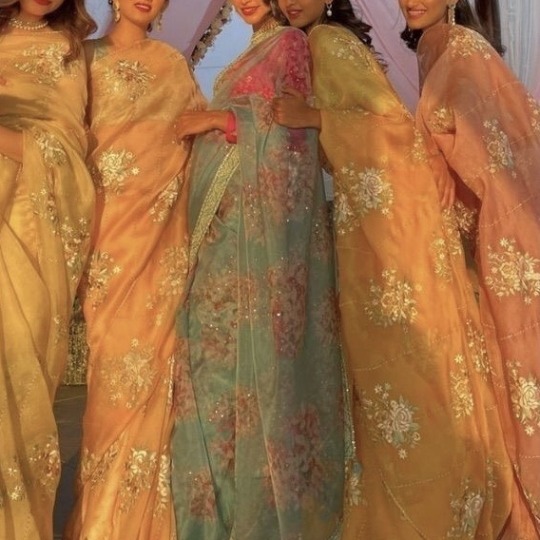
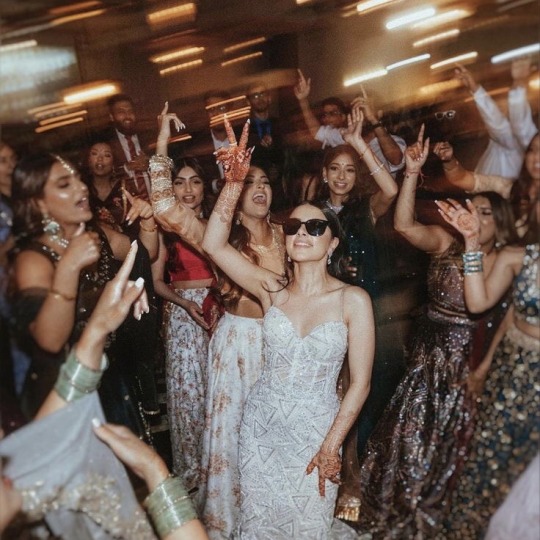
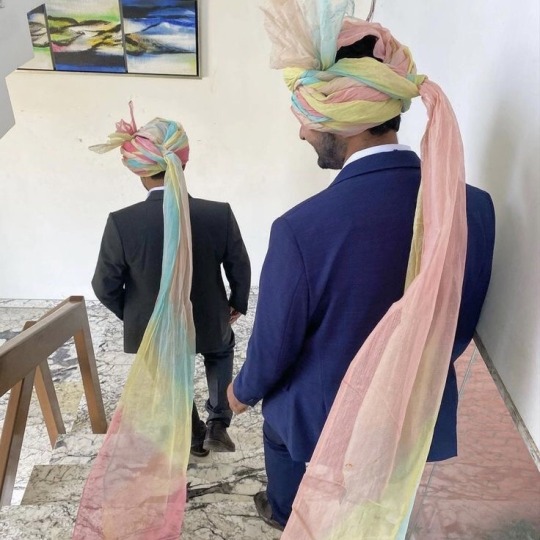
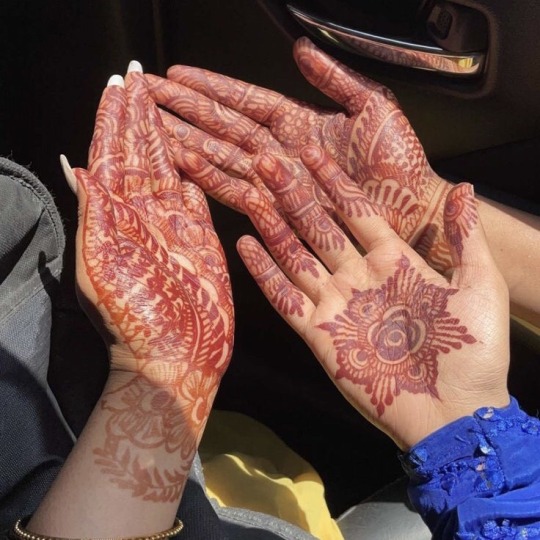
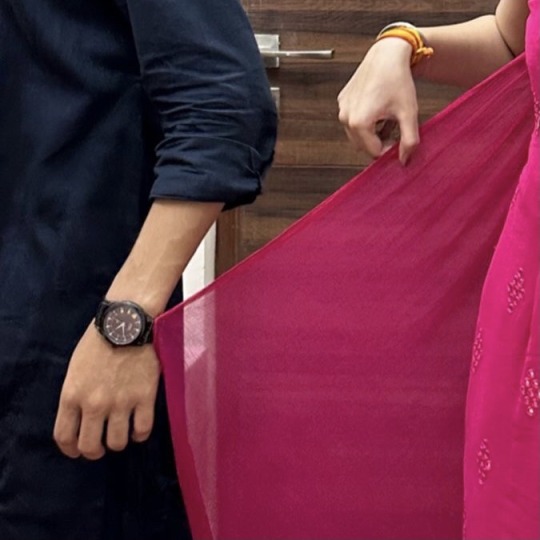
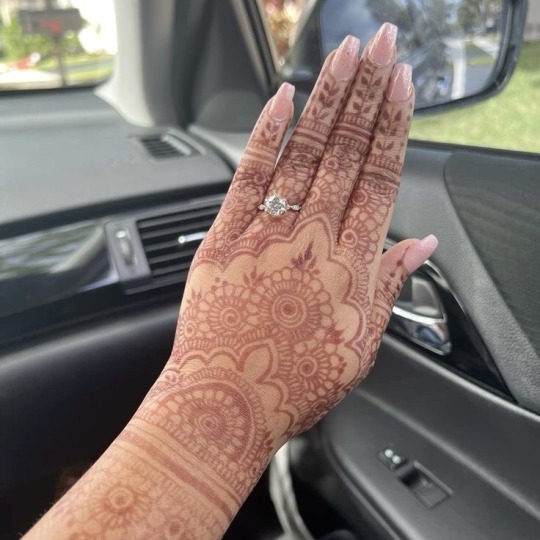
liked by judebellingham and others
yourusername celebrating love with my love 💒
view all 57,374 comments
judebellingham can’t wait for our turn 💍❤️
↳ yourusername ilysm 🥹❤
user1 THE LAST PIC????????? RUE,,,, WHEN WAS THIS????
user2 🥳🥳🥳CONGRATULATIONSSS🥳🥳🥳 (i’m gatecrashing the wedding)
trentalexanderarnold best man position still vacant? 🫣
↳ jobebellingham unfortunately no 🙄
user3 we need the proposal story asap!!!
↳ user4 and a whole album worth’s of pictures too !!!!!
#me when the black kurta-wearing baddie tells me to do smth: 🫡🫡🫡🫡🫡🫡🫡#this exact post has been festering in my drafts since nov 2023 pleaseeee#real ones will remember this was supposed to be a smut lmao i’m so glad i went down this routine instead!!! <33#i do have to say that it’s sooo hard finding non “north indian/pakistani” inspo pics on pinterest even if u do search for specific cultures#+ dark skinned south asian content is basically non existent which makes me sooo frustrated so im so sorry for the rlly limited visuals :((#jude bellingham#jude bellingham fluff#jude bellingham x reader#jude bellingham imagine#jude bellingham x you#jude bellingham fanfic#jude bellingham x fem!reader#jude bellingham x south asian reader#football imagine#footballer imagine#footballer fluff#football smau
163 notes
·
View notes
Note
do you know or have thoughts on why the dm characters sometimes reference ‘hell’ (as in ‘what the hell?’) given how the series handles religion? is that an anime thing or translation thing or…???
This is such a great question, and fun to answer, so thank you for writing to me!!!
I think there's two things happening at the same time: What does hell really mean in English, and what are the characters actually saying in the original Japanese?
If the characters say hell in the original manga or in any translations, I think it is pretty safe to assume that they aren't referring to the Christian hell specifically, since it doesn't appear to exist in the Dungeon Meshi world. They are instead referring to the generic concept of a hell.
NON-CHRISTIAN HELLS
Hell is a word that can refer to a "bad afterlife" in many different world cultures. Obviously all of these cultures have their own names for these places, but when they are translated into English they are frequently referred to as "Buddhist hell", "Hindu hell", "Nordic hell", etc.
The word "hell" was adopted by Christians to describe something in their religion, but does not originate with them.
The modern English word hell is derived from Old English hel, to refer to a nether world of the dead. The word has cognates in all branches of the Germanic languages, and they all ultimately derive from the reconstructed Proto-Germanic feminine noun xaljō or haljō ('concealed place, the underworld'), and can be traced back even further to Proto-Indo European.
When the Germanic peoples were converted to Christianity, the word "hell" was adopted to refer to the Christian underworld. Before that time, hell was called many different things by the Christians, including "Sheol" (grave, death, pit, underworld), "Gehenna" (valley of wailing), "Hades" or "Tartarus."
(The first two are Hebrew words, and the latter two are Ancient Greek. All of these words are attempting to describe similar things, a bad afterlife.)
These Germanic cultures (most of Northern, Western and Central Europe) are the primary cultural influence of Dungeon Meshi's Eastern and Northern Continents, where the story takes place, and where most of the characters are from. So the word hel/hell would be native to the region, and logical for the characters to use both as a swear word, and also as a reference to whatever afterlife they might believe in.
WHAT ARE THE CHARACTERS ACTUALLY SAYING THOUGH?
Dungeon Meshi is, for better or for worse, written in standard, contemporary Japanese, without any particular emphasis or attempt to sound "old fashioned" or like it is "fantasy", so any changes or additions made in translation to make the dialog or narration sound that way are just that: additions and changes.
The changes made during translation aren't inherently bad, but the original text is very neutral, and open to interpretation.
For example, Yaad calls Laios "tono/dono" in Japanese, which is an honorific that has no direct English equivalent, but is used between two people of similar social status, when one wants to be extra polite to the other. It does not imply nobility, but respect higher than "mister" and lower than "lord." Most English translations have rendered this as "Sir Laios" which isn't literally what Yaad says, but conveys the idea with something that "feels right" for the setting.
It may be that in Dungeon Meshi the characters are literally saying the English word "hell/heru" in Japanese (ヘル), the word jigoku (地獄), which is the Japanese word for Buddhist hell, another word for a specific different underworld or afterlife, they are saying a Japanese swear word, or just using casual/impolite language that doesn't have a direct translation into English, and so needs to be localized into something that will make sense in English.
The last one is most likely what is happening, and I can think of a couple of common phrases that would most likely be translated into "What the hell?":
The polite, neutral way to say "What's that?" or "What [should I] do?" is "Nan-darou? (なんだろう?) or "Nani?" (何), which just means "What?"
The more casual, aggressive, masculine way of saying it is "Nani-kore?" (なにこれ?) which doesn't mention hell in any way, but translates to something like "What the hell?" or "What the fuck?"
It's more rude because it's casual speech, but doesn't literally use words for hell or fuck in it. It technically means the same thing as "Nan-darou?" or "Nani?" But translating it the same way would be ignoring the context and tone of the words.
Another thing that's often said in Japanese is "Uso!" (うそ!) Which literally means "lie" or "not true", but in conversation it’s often used to say things like "you're lying!", "For real?!", "really?", or "No way!"
Often these exclamations of "Uso!" don't have anything to do with lying or untruths, they are meant to express surprise (this can't be happening!) or a response to someone talking about an outrageous and terrible event they experienced, like saying "No way! I can't believe that happened to you!" It's also sometimes translated as "What the hell…" or "Unbelievable…"
If the translators tried to keep this sort of thing literal, the manga would be full of lines like:
CHILCHUCK, running for his life from a mimic: What's this?! (Nani-kore?!)
(He isn't literally asking what the mimic is, he is expressing surprise, so he should shout some curse words in English like hell, fuck, shit, etc.)
MARCILLE, horrified by the chimera: Lie! (Uso!)
(She isn't just saying the word "lie" with no context, she is expressing shock, horror and disbelief at what she sees, so she should say something like "No, that can't be..." or "Impossible...")
I am not an expert in Japanese, but I hope that all of this is helpful to you, anon, and anyone else that's interested in this sort of thing!
23 notes
·
View notes
Text
a reader's guide to otomehonyaku ☽ translation masterpost & request guidelines (2024)
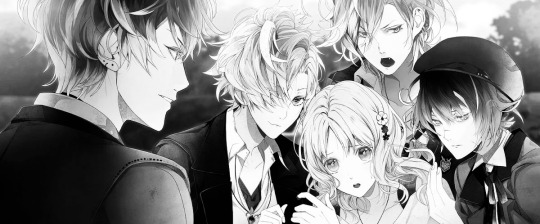
This is a masterpost of all of the translations I have done so far, plus my writing, as well as my request guidelines for your reference!
If you have anything Diabolik Lovers-related you would like me to translate, feel free to reach out through my ask box! Please read the guidelines below before submitting a translation request.
Please do not reuse or post my translations elsewhere, in any form whatsoever, or translate my work into other languages without my permission.

Visual novels
☽ DIABOLIK LOVERS: CHAOS LINEAGE ☽
Mukami Ruki
ONE・ TWO ・ THREE ・ FOUR ・ FIVE ・ SIX ・ SEVEN・ EIGHT ・ NINE ・ TEN ・ ELEVEN・ TWELVE ・ THIRTEEN ・ FOURTEEN ・ FIFTEEN (BLACK VER.)・ FIFTEEN (WHITE VER.) ・ LABYRINTH END (BAD) ・ EUPHORIA END (GOOD) ・ HEAVEN STORY
Kino
ONE ・ TWO ・ THREE ・ FOUR ・ FIVE ・ SIX
All other chapters were translated by @kyouxa, please refer to her Chaos Lineage masterpost here!
─── ・ 。゚☆: *.☽ .* :☆゚. ───
Drama CDs
☽ DIABOLIK LOVERS: DAYLIGHT ☽
Mukami Ruki
ANIMATE TOKUTEN "SLEEPING TOGETHER ★ WITH VAMPIRE"
SKIT DOLCE & REJET SHOP TOKUTEN "ABSURD LESSON ♪"
RUKI'S LETTER (STANDARD EDITION)
RUKI'S PROPOSAL LETTER (DELUXE EDITION)
─── ・ 。゚☆: *.☽ .* :☆゚. ───
Books & short stories
☽ DIABOLIK LOVERS: OFFICIAL ANIME NOVELIZATION ☽
CHAPTER 1 ・ CHAPTER 2 ・ CHAPTER 3 ・ Coming soon...
☽ DIABOLIK LOVERS: VANDEAD CARNIVAL ☽
Genteiban Special Booklet
KARLHEINZ’ INVITATION
Character info: AYATO・ KANATO・LAITO・SHUU・REIJI ・SUBARU・RUKI・KOU・YUMA・AZUSA・KARLHEINZ & YUI
☽ DIABOLIK LOVERS: LOST EDEN ☽
Stellaworth Tokuten Special Booklet
AYATO (by @kyouxa) ・ LAITO by @kyouxa ・SHUU・ REIJI・ KANATO・ SUBARU・ RUKI ・ YUMA・ KOU・ AZUSA ・CARLA ・ SHIN (coming soon...) ・ KINO (coming soon...)
─── ・ 。゚☆: *.☽ .* :☆゚. ───
Miscellaneous
☽ OTHER DIABOLIK LOVERS MEDIA ☽
YANDERE RUKI VIDEO (MORE,BLOOD MANSERVANT ENDING)
☽ MY WRITING ☽
IT'S POSSESSION THAT WILL SET ME FREE (Ruki/Yui, mild NSFW)
MUKAMI BROTHERS WITH THEIR S/O'S LIPSTICK STAINS (SFW)

Translation request guidelines
I am open to translating any Diabolik Lovers-related materials, including (but not limited to) drama CDs, games, short stories, magazine articles, interviews, comics, (fan) artwork, and such. Any character is welcome!
When requesting a translation, please be aware of the following:
☽ Please provide the source materials which you would like to have translated. I do not have the financial means nor the time to personally buy all of the drama CDs or tokuten for all 13 characters, for example, so if you want something translated: please include a link to the source materials. These could be links to audio files on SoundCloud and BiliBili, or links to Tumblr posts with scans of short stories or interviews and the like.
☽ In all cases, it is your own responsibility to ensure that the source materials—particularly fan-made artwork and scans—have been acquired with full permission from the original poster. If the original poster has NOT given you permission to repost or reuse/translate the materials in question, I will NOT translate them.
☽ This probably goes without saying, but I do these translations for fun—I enjoy doing them, but I am also busy in my daily life. I will try my best to finish and post the translation as soon as possible after your request, but I give no guarantees on how long they will take. I do work relatively quickly given my current language skills in Japanese, but the time I can spend on translating fluctuates a lot per week.
☽ If you would like me to translate Japanese-language materials from other otome franchises or pop culture related things, please consult with me and I’ll see what I can do!
☽ DO NOT REPOST ANY OF MY TRANSLATIONS ELSEWHERE, IN ANY FORM WHATSOEVER (INCLUDING VIDEO), OR TRANSLATE MY WORK TO OTHER LANGUAGES WITHOUT MY PERMISSION.
#diabolik lovers#dialovers#diabolik lovers translation#diabolik lovers translations#diahell#otomehonyaku#my translations#my writing#diabolik lovers chaos lineage#diabolik lovers more blood#diabolik lovers haunted dark bridal#diabolik lovers dark fate#diabolik lovers lost eden#diabolik lovers vandead carnival#diabolik lovers lunatic parade#diabolik lovers drama cd#diabolik lovers drama cds#diabolik lovers fanfiction
25 notes
·
View notes
Text
"oh huh, usually getting my official business and chores done for the day energizes me to work on my projects. i wonder why my brain is all scrambled up and i feel both unmotivated and anxious like should be doing something?"
turns out migraine prevention meds have been working so well that i managed to forget how auras for big nasty ones feel lol
wanted to transfer the stuff i worked on during my trip from docs to the working file and start neatening things up but oop
fingers crossed it'll fully clear out before bedtime so i can at least start looking into how i want my tenses to work in the flashback
#yea fic talk#i don't want the entire thing to be in past perfect (i think it's called!)#gotta figure out how to cleanly transition from telling about a past thing#into diving into the moment and then back to present#im also once again thinking about some stylistic choices#like how to refer to characters and what to translate or include as is#like japanese honorifics#prolly just going to go with what's most fun for me and comes naturally#like i don't get how others can do third person pov and use arataka instead of reigen#feels like you're calling your pov character babygirl as if it's a neutral term#then again i tend to have single name ocs and feel strongly about this mostly when im writing other ppl's characters#im not close enough to him to call him arataka when that's not what he's mostly called in the narrative nor what his spinoff is called#okay maybe i saw a post about needing to research cultures and how that affects name use#and like. it was weirdly aggressive but mostly seemed confused on its own points#what narrator calls characters and what characters call themselves and others. don't necessarily follow same rules#and yeah this tangent got too long#point is how the pov character is called is how i or the narrator construct of me calls them#other characters are loosely called what the pov character would call them#in my usual style of writing anyway
4 notes
·
View notes
Text
a reflection on MatPat's plagiarism
Hello, my name is Della, or micer2012, and 2 years ago Game Theory plagiarized three Tumblr posts of mine, making a video that now holds almost 6 million views.
My posts explaining his plagiarism made their rounds on Reddit, Tumblr and Twitter, but despite the Hermits and Pooka commenting on it (generally in support of me or saying they don’t know enough details about the situation to say either way), MatPat and his team have never owned up to anything, and no mention of my name is present on the video. The one Reddit post they made denying it (which was made before my detailed takedown, which they have never responded to (though the mods on the r/GameTheorists Reddit were kind and made sure it stayed up)) didn’t even mention me by name, just referring to me as “a tumblr user”. (Though one of the screenshotted comments in the body of the post does say my name)
This experience was baffling, but it’s overall had a positive impact on my life. r/Hermitcraft gave me a Golden Apple Award (post of the year, 2021). My inbox was filled with excited fans, wanting to ask me questions or pose their own theories, far more than the hate I got. (Though the hate I got from Game Theory fans was VERY funny. I wondered why none of them gave me shit about saying “MatPat misgendered Evil Xisuma” before realizing none of them read that far into the post.)
And getting on a more personal, and much more important note, I met most of my current online friends through this, including my partner. It helped me grow closer with my irl friends as well and gave me an entertaining story that I tell whenever I have the chance. It was one of the first things in my life that really made me feel like my talents, my autistic hyperfocusing and analyzing of things I love, could be valuable. Useful. Exploitable. It blew my mind that MatPat thought an autistic kid’s ramblings about a Minecraft Youtube joke character were good enough to steal. To put an audible sponsorship on. To get 6 million views off of.
And that’s why I’m writing this post, this update years later. As you might’ve been able to guess, Hbomberguy’s Youtube video on plagiarism reopened this wound. It was really hard for me to sit through, it took days of pausing and taking breaks, because I had experienced everything he was talking about firsthand.
In my 10 page long takedown post, I wrote about how his rewording of my sentences made him say things that were incorrect, just like Filip did. The content farm production style that made big companies like Cinemassacre take one creator (AVGN/MatPat) and turn him and his content into a brand, a voice that reads out scripts by other people with other opinions/theories, is a history shared with Game Theory. What really hit me was Harris talking about how big creators only do this to people they think they can get away with doing it to. How they view their victims as lesser, as not deserving of their words, repackaging them as their own to give to an audience that can gain from hearing them, but deserves better than to have to listen to the original victim.
That’s the thing, I 100% think a video version of my theory to expose to a bigger community than “Evil Xisuma Fans on Tumblr” is a great idea!! Near the end of the video Harris talks about how video adaptations of things could be a great market, even an accessibility tool, and I completely feel that about my posts. I wrote them quickly assuming the reader was someone well versed on Evil Xisuma lore, after not even watching most of the CarnEvil series, and the diagrams I made to explain them are even less comprehensible. Harris makes a joke that I completely agree with,
“I’m sure some of my videos would do very well if someone translated them into English.”
I don’t think I would’ve ever made my posts if I didn’t have autism, and a special fixation on Evil Xisuma and Hermitcraft. I made them because I felt the character was being done an injustice, and because I wanted to share with other superfans this theory that might explain it away. I do think that MatPat plagiarizing me was ableist. I used to wonder a lot if this would’ve happened if my posts were articulated better, if they had been peer reviewed, if the posts themselves had been spread to a wider audience before MatPat made his video. At one point when the discourse was fresh (before I had the time to write out my 10 page rebuttal), a bigger YouTuber (100k subs at the time) messaged me and started talking on Discord, interested in possibly making a video on the discourse, but I think my style of typing and general enthusiasm drove him away. You can tell by a single look at my blog (or my original 3 posts!) that I don’t usually type like this. This post you’re reading now has been peer reviewed and edited, and took me hours to format correctly. That video could’ve been huge, the entire outcome of this MatPat situation would probably be much different.
I also used to stress a lot about “being the one who ruined Evil Xisuma’s story”. If you didn’t know, to me S8 Evil Xisuma’s story got wrapped up pretty quickly and unsatisfying (in my personal autistic opinion). (though this might’ve been due to s8 being experimental and ending early with moon big) There was no real culmination of the plot points and arcs going on, and I don’t want to blame myself, but when Xisuma said on stream (when the MatPat thing was first going on) that he didn’t want to focus on the discourse or draw more attention to it, it makes a lot of sense to me that he just wanted to wrap it all up as quickly as possible. For a while I beat myself up about it, of ruining the story of this character I love, but it’s not my fault. If anyone’s, it’s MatPats, but I don’t think it’s useful to just blame someone else. That’s how the story ended up going, and that’s fine. This is Evil Xisuma we’re talking about, their inconsistent lore is what made them such an interesting character. And notably, Pooka made an animation with an awesome culmination of Jeff, the Dreamer, Evil Xisuma, and his own sona’s story, and it makes me so happy to watch. Whatever Pooka does is of course his own choice, but I’m glad he got to give this personal story his own ending (if it is an ending, and not just the start of a new chapter!).
Typing this all out and getting it off my chest has made me feel a lot better. For a while I wanted to make my OWN video essay about Evil Xisuma’s lore and CarnEvil’s lore, actually going episode by episode to explain it instead of just assuming you knew as much about Evil Xisuma as I did. That idea is still not off the table, but MCYT isn’t something I’m that into right now. Maybe if something else comes out about Evil Xisuma I’ll get back on it, but for now I’m fine with letting that go. But I want to make other videos, share other theories and analysis… if I have the freetime I’d love to make YouTube videos, and if I don’t have the time I’ll continue posting to my tumblr and infodumping to my friends. Apparently my infodumping is valuable enough “content” to steal! Writing this out has made me feel a lot better though, I’m really glad I got it out.
If anyone ever wants to talk to me about the things I’m obsessed with, or reach out to me as a source in a bigger discussion about Game Theory or other channels, my inbox is more than welcome :] Thank you for reading!
Sincerely, a tumblr user.
#exiavojtmmc#hermitcraft#matpat#gt#game theory#hc#mcyt#evil xisuma#hbomberguy#plagiarism#james somerton#jeff the minion#mine#micer2012#hcs9
5K notes
·
View notes
Text
Qualia and Ascension in Rain World
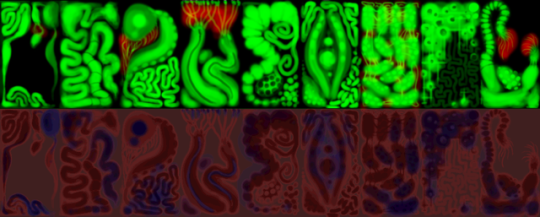
(To clarify I'm mostly talking about base-game lore and not including Downpour, but honestly most of these things can transfer over)
Qualia
One thing that’s relatively hidden in Rain World’s text and subtext is the concept of qualia. Qualia is described as being, “sensory experiences that have distinctive subjective qualities but lack any meaning or external reference to the objects or events that cause them.” It’s a personal sensory experience that cannot be comprehended by another person other than the individual themself, and are often hard to convey via language.
Qualia is a reoccurring motif in Rain World, but what’s more important is the way in which it’s conveyed to the player. The picture that’s painted is that of a world or civilization that placed a great importance on the individuals’ experience, and it’s shown through pearls or environmental details.
Here are some examples of qualia appearing in the text through pearls.
“It's qualia, or a moment - a very short one. Someone is holding a black stone, and twisting it slightly as they drag their finger across the rough surface. The entire sequence is shorter than a heartbeat, but the resolution is extraordinary.”
“A memory... but not really visual, or even concrete, in its character. It reminds of the feeling of a warm wind, but not the physical feeling but the... inner feeling. I don't think it has much utility unless you are doing some very fringe Regeneraist research.”
“This one... is authored by Five Pebbles, when he was young. There has been an attempt to scramble the data, but it's sloppily done, and most is still somewhat legible. It's written in internal language, or thoughts, so it is hard for me to translate so you would understand.”
But the most prominent examples of qualia and it’s importance in this world are the Memory Crypts and possibly ancient naming conventions. The deep purple pearl (shortened) found in Shaded Citadel states,
“In this vessel is the living memories of Seventeen Axes, Fifteen Spoked Wheel, of the House of Braids (…) Seventeen Axes, Fifteen Spoked Wheel nobly decided to ascend in the beginning of 1514.008, after graciously donating all (ALL!) earthly possessions to the local Iterator project (Unparalleled Innocence), and left these memories to be cherished by the carnal plane. The assorted memories and qualia include:”
Ancients likely mutated their own neural tissue into the cabinet beasts we see in Shaded, which were used to store their memories and qualia before ascension. Even james said once "how 5 pebs got the rot is a good hint here" in response to someone asking how cabinet beasts work, and how they're made.
Adding on to this, ancient (and iterator) naming conventions seem to be built off of the concept of qualia, with them focusing on individual images or experiences.
Nineteen Spades, Endless Reflections
Droplets upon Five Large Droplets
Two Sprouts, Twelve Brackets
Looks to the Moon
Generally, this all points to a world focused on the expression and preservation of the individual experience. You could even consider some of the echo dialogue as more evidence for this running motif, but I already have too many quotes lol.
Ascension
So now time to talk about my interpretation of ascension. In short, you turn into a worm, but I should probably explain more than that.
So its been surfacing on rw-tumblr that the light in the end of the game is called the egg in files. Although file names shouldn't be taken as fact or canon, it is pretty obvious given the birth imagery.
But something a little lesser known is what happens to the worm that takes us down to the void-sea depths. Void worms normally have a bright glowing effect, on their body, which is present for ours as well. But after it unhooks us, it swims down, and when it passes us on it's way back that glowing effect is gone.
To be honest, I don't really think this can be interpreted in many ways, but the most obvious one and the one I personally subscribe to is that the worm laid the egg. Biology and spirituality really aren't that different in Rain World, it's implied that karma is stored in the brain through Five Pebbles's slideshow. Adding on to that, we see voidspawn after eating an iterator neuron. One's spiritual state is innately tied to their mental state, and that dictates what and what they can't perceive.
And for that reason I decide to take a more biology leaning approach to what happens in the ending. At face value, we are fertilizing the egg of a void worm to be reborn into a voidspawn.
Not only do void spawn and void worms have multiple characteristics in common, (worm like bodies, tendrils/tentacles, glowing heads, void spawn look microbial and void worms are likely some of the oldest "life" in game)

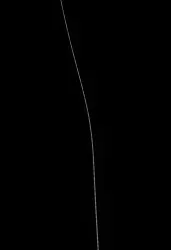
but voidspawn are seen inside egg-like coverings and share the same egg light seen in the end of the game, confirmed to be the same thing by Videocult in a livestream they did.
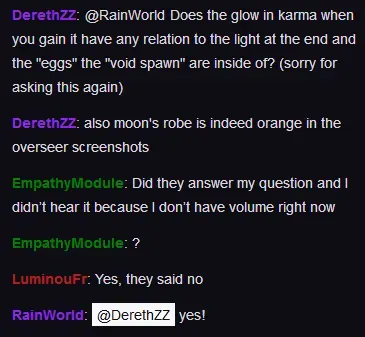
I believe that all this points to ascension being re-birth into a voidspawn, which eventually undergoes metamorphose into a worm. Higher-dimensional beings, who manifest and give birth to a new world.
So how does this tie in with qualia? Another thing you might know is that the area in which void spawn are most plentiful is Shaded Citadel and areas in Shoreline near Shaded. And shaded is absolutely packed with Cabinet Beasts, even outside Memory Crypts. I believe these qualia-storing creatures are what manifest voidspawn.
From what we see in ascension, it still looks physical and largely based around the real world. Hunter still has his scars and see's an iterator, survivor sees the slug tree in a more mystical and formless state, and monk sees survivor frankly just looking like a normal slugcat. I think that ascension is a product of qualia. We transcend our earthly knowledge via the egg, and our own qualia is used to give birth to a new world. This is why voidspawn appear most in Shaded Citadel.
Now I won't be getting into Void-Worm theories too much here, I'm mostly focused on ascension but I can't ignore the Gnosticism parallels. For those who don't know, Void Worms heavily resemble the Yaldaboath from Gnosticism, along with sharing some similar celestial motifs.
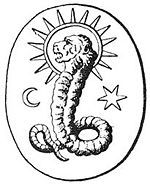
and running with that some people theorize that, like the Yaldabaoth, void worms are responsible for manifesting the material world. Ascension seems to be a mix of the concepts of Gnosis and Nirvana, but I believe it might lean more on Gnosis.
From my limited knowledge, Gnosis is a few things, some of which being a state achieved from experiences or intuitions, and an essential part to salvation is personal knowledge. While researching a bit, I came across this text by Peter Wilberg called "From NEW AGE to NEW GNOSIS" which brings up some comparisons between Gnosticism and qualia as well.
"Gnosis is subjective knowledge of an inner universe made up not of matter, energy, space or time but of countless qualitative spheres or ‘planes’ of awareness – a knowledge obtained directly through inter- subjective resonance. It is the subjective science of this inner universe."
One thing though that has been brought up when discussing this is how this can be consolidated with the tone of the ending. It is pretty un-ambiguously happy, but if we're going with the Void worm Yaldaboath theory then that would put a bit of a sour twist on it right?
I agreed with these for some time, but now I actually think it ties in perfectly with Rain World's core themes as stated by the devs, "overcoming differences and finding empathy." I don't think the void worms are "evil" or malevolent, but I think they (and subsequently us after ascending) play a key role in demonstrating this theme.
By manifesting the physical world, we allow these souls to experience life and develop their own qualia so one day they can ascend themselves. We are shown compassion, and pass it forward.
661 notes
·
View notes
Text
Low key the hunting dogs are so much further detached from humanity than I think we give them credit for.
Aside from the obvious dehumanizing of themselves to characters like Sigma or Kunikida, they also just treat their bodies like objects.
Teruko punctures her own eardrums without hesitation to protect her brain.
Jouno’s first thought when being lit on fire is using his blood to cool the flames.
Tecchou says that even if they knock him down from the helicopter, he’ll just use his sword to get right back up, not even mentioning the pain.
Tachihara stabs himself with his own ability to keep his cover. When the coin bomb explodes in his hand, he’s only mildly upset that it could’ve “messed him up”, before going back to what he was doing.
Fukuchi was willing to be the centerpiece of his plot for world peace, and intentionally took the blame. It’s no mistake that his plan included his death.
Beyond all that, Teruko describes them as slaves to society. Tachihara (and I think Fukuchi also does this) refers to them as the fangs of the government.
One of the translations of Fukuchi’s speech to Fukuzawa while he’s being interrogated is that the Hunting Dogs won’t rest until they catch their prey because that’s how they were designed.
Idk just something abt the silly dog soldiers and their own humanity. Not questioning it, that’s not their place. They already know that they’re weapons.
#bsd#bungo stray dogs#bungou stray dogs#hunting dogs bsd#bsd hunting dogs#bsd tachihara#tachihara michizou#jouno saigiku#bsd jouno#bsd tecchou#tecchou suehiro#teruko ookura#bsd teruko#bsd fukuchi#fukuchi ouchi
412 notes
·
View notes
Text
terms of address: maruki
I was asked how the squad refer to Maruki, so here goes.
first, the normies
Many of the cast refer to Maruki exclusively as "Dr. Maruki": 丸喜先生 Maruki-sensei. These mentions are universally in kanji.
Ann has 41 of these, and often uses sensei by itself;
Haru has 26 of these, and uses sensei alone a couple of times, during Maruki's Palace;
Makoto has 27 of these. She uses sensei alone quite often;
Yoshizawa has 41 of these total, 14 as Kasumi and 27 as Sumire. She calls Maruki just sensei often.
Noticing anything? Yeah: they're all the girls. These particular characters consistently seem to have relatively colourless and unmarked speech. This may in itself, of course, be a form of marking, since expectations around gendered speech in Japan can be so strong.
the relatively boring
Ren appears to always use "Maruki", apart from one instance very early on when an option, "Ask about the counsellor", includes Maruki-sensei. He also always uses kanji; protagonists don't have to be polite.
He calls Maruki sensei alone once, during his confidant. Kawakami gets it more often, while Takemi gets it constantly.
slightly more edgy
While Futaba always uses "Dr. Maruki", she slurs it a little, making it slangier: 丸喜せんせー Maruki-sensee. She always uses kanji for "Maruki", except in the text chat after he visits Shujin, where she's only heard his name spoken!—which is a cute detail. Occasionally she uses せんせー sensee by itself, which is distinct from her 先生 sensei meaning "a teacher".
Ryuji, again, virtually always makes it "Dr. Maruki", usually Maruki-sensei in kanji; a few mentions very early on, when they're still talking about the new counsellor guy, are just straight "Maruki". Also, in his counselling session, Ryuji almost just calls him that!—ultimately deciding to make it "Dr. Maruki":
Ryuji
なあ、丸喜⋯センセーってよ、よく『変わってる』って言われね?
naa, maruki... sensee tte yo, yoku "kawatteru" tte iwarene?
Hey, Dr. Maru— ah, I mean, Doc. Anyone ever tell you you're kinda… not normal?
The meaning is a little lost in translation here, with Ryuji cutting from the normal form of address to a nickname. Also, in Maruki's Palace, he recognises Maruki on one of the videotapes, and starts off in hiragana before finishing in kanji. It feels a bit as if he isn't initially sure what he's seeing:
Ryuji
まるき… 丸喜先生?
maruki... maruki-sensei?
Maruki... Dr. Maruki?
He uses sensei by itself a couple of times, far fewer than you might expect; his "Doc" is usually either glossed in, or was originally Maruki-sensei, "Dr. Maruki".
He also uses 大先生 daisensei, "great leader/teacher/artist" etc, as a term of abuse, aimed at palace bosses such as Shido and Madarame. 獅童大先生 shidou-daisensei—"that stuck-up bastard Shido!".
the slightly outlandish...
Morgana overwhelmingly uses katakana for names, and Maruki is no exception. He talks about him a lot, always in katakana, as マルキ Maruki. He never uses any honorifics for him.
He has only one use of kanji, 丸喜 Maruki, in "will you meet with this confidant?" text, around I think rank 5, which looks like it may be a slip.
the strangely polite...
Akechi, of course, fails to grace Maruki with his title of "doctor"; he's just plain "Maruki". The localisation sometimes makes it "Dr. Maruki", but that's a gloss; Akechi never once uses sensei (or any other honorific) about him.
But he uses an honorific to Maruki, once:
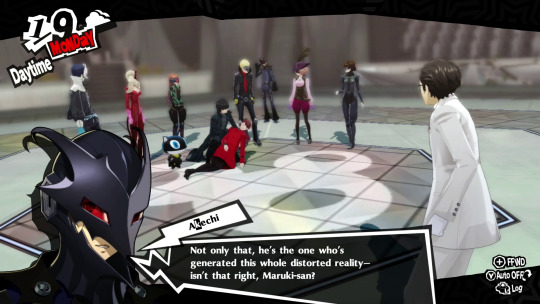
That "isn't that right" is ですよね desu yo ne, which might seem startlingly polite for third semester Akechi. In fact, he's rather consistent about his masu forms to Maruki—and only to Maruki—during the third semester.
He has no uses of desu or -masu/-masen, for instance, to anyone else in the third semester. It's actually rather cute, because it makes it clear a number of his lines in the 1/2 and 1/9 Palace are directed not to Ren or Yoshizawa, as it might seem, but to Maruki.
So this looks like a sardonic little aside, and I'm sure there's a lot of that in it—"Maruki-san". But this is also the only time Akechi ever addresses Maruki by name. And since he has all these desu and -masu forms going on around Maruki, then maybe he just calls him Maruki-san, full stop.
Did I mention he's a weird boy?
...and the downright weird
That leaves us with Yusuke, who (as nobody will be surprised to hear) does his own thing that raises some fascinating possibilities.
Yusuke only appears to address Maruki by name once, when they first meet in the courtyard, and as you'd expect, he calls him sensei—丸喜拓人先生 Maruki Takuto-sensei, "You are Dr. Takuto Maruki, correct?".
But every other time Yusuke uses sensei in the script? He's referring not to Maruki, of course, but to his sensei, Madarame. That initial approach to Maruki, stranger to stranger, face to face, is the only time he uses it to anyone else.
So what does Yusuke call Maruki? He calls him 丸喜氏 Maruki-shi.
what is shi
氏 shi is a very formal and exclusively third-person term, usually seen in writing, or heard from newsreaders. It's often translated "Mr X", which can be very odd to hear in media that retains honorifics like -san and -kun; "Mr. Akechi's coming on!" is an example, from 6/10. And Akechi is, in fact, usually mentioned as Akechi-shi on the evening news.
Yusuke's Maruki-shi is universally translated as "Dr. Maruki", as if he'd just said Maruki-sensei like everyone else. Which is a little bit of a shame.
Yusuke also uses shi for one other person—the art patron Kawanabe, in his confidant, before you meet up at the sushi bar. Most of the rest of the time, before and after, Yusuke just calls Kawanabe "Kawanabe" in third-person, with no title; he pulls out a Kawanabe-san at rank 10, after he's won the contest—face to face, of course, since shi is only third-person.
On the other hand, Yusuke never mentions Maruki at all without a title.
the other time yusuke uses sensei
Okay, I lied: Yusuke has one other instance of Maruki-sensei. This, like Morgana's single lapse into kanji, is in prompt text: "Are we going to Maruki's Palace today?" Again, I think this is likely an error.
revision history
Click here for the latest version.
v1.0 (2023/12/29)—first posted.
#persona 5#p5 meta#p5 reference#japanese language#p5 terms of address#takuto maruki#yusuke kitagawa#goro akechi#ryuji sakamoto#the squad
453 notes
·
View notes
Text
The Narrative Importantance of Hualian's Sexual Intimacy
This is a repost and minor edit of a thread I made on Twitter yesterday. This is a topic I have always wanted to talk about because of how often it comes up in TGCF fandom, time and time again.
‼️CW: mentions of sexual assault, self-harm, bodily injury‼️
⚠️Major spoilers for the entire novel ahead⚠️
---
Saw a question the other day on what relevance Hualian being sexually intimate by the end of the novel had to either the narrative or Xie Lian's character arc.
In short: it bears significant relevance, especially in context of other themes the novel explores like bodily autonomy.
Throughout the novel, we see time and time again that Xie Lian is often dehumanized by pretty much everyone—including himself—with the sole exception of Hua Cheng. I've talked more in depth about it in an old twt thread, for those interested. @/stalliondany on twt has also made an excellent recent analysis that goes deeper into the specific ways Xie Lian was used as a physical shield, martyr, or scapegoat for others without thought to his humanity or suffering. I highly recommend reading it first!
But to sum it all up: it's important to Xie Lian's character arc to keep in mind that he is used to seeing his own body as a tool to solve problems. And in crucial narrative moments, he is robbed of his bodily autonomy, and either brutalized or violated in service of others.
One of the plot points that ties together all these concepts is actually... Xie Lian's chastity vows. That will be the main focus of this post.
When he was a young teen (or possibly as a child), Xie Lian took an oath of chastity because such was the norm for cultivators seeking ascension in Xian Le. To Xie Lian, even as he grew older, he never had an issue with this because he just never felt sexual attraction to another person, or any desire to be intimate in that way. Even if he yearned for the concept of being loved. And indeed, at first glance, his chastity vows may seem like nothing more than a side note. Or even a funny gag when it comes to Hua Cheng (later).
In reality Xie Lian's chastity vows are not only used against him, but paint a very disturbing picture with regards to his repeated violation.
The Land of the Tender scene is the most obvious example of this. Xie Lian's vows are directly tied to his spiritual powers, and because it affects how his followers see him. They place a high value on his chastity as being vital to his moral character.
For reference, an excerpt from TGCF vol. 3 of the English print translation, page 135:
Xie Lian's method of cultivation required a pure body. Those who worshipped the ascended cultivators who practiced this path were firmly convinced of the transcendence of gods untouched by earthly desires. If they couldn't protect their purity, their following would no doubt collapse and their powers would be devastated. It wouldn't be as serious as plunging from godhood to back to mortality, and there was still the possibility of recovery after many more years of cultivation—but with things as they were now, there was no time for him to sit behind closed doors and cultivate for years!
As a reminder: it is Bai Wuxiang who orchestrated this whole thing. Him trying to compromise Xie Lian in this way is horrific on many levels, yet that's not the main point I want to make here. It's that to preserve his "pure body," the solution Xie Lian realizes is to severely harm himself. To impale himself with his sword through the abdomen.
The juxtaposition of having to maintain bodily purity versus the gruesome violence inflicted on his body is extremely stark.
This grim contrast is no more evident than in the 100 swords scene. Where Xie Lian's body is literally brutalized and defiled to an unthinkable degree. To the point where he, quote: "no longer looked human." Yet he emerges from that temple physically "pure" all the same. His chastity vows were not broken, his body healed without scars. As though he was untouched.... And yet, he was completely destroyed mentally. It left permanent effects on him as a person. It's even worse when the scene is read analogous to sexual assault, as many have talked about before. I think that interpretation actually hits the nail on the head, especially keeping in mind the Land of the Tender scene and all the similarities between them.
Following the 100 swords scene, Xie Lian of course has a complete disconnect between himself and his body. I believe this is part of why he doesn't really feel pain, except when he is with Hua Cheng, who treats him and his body as one. As a person who is cherished, and loved. Hua Cheng is adamant in his adoring treatment of Xie Lian. Small injuries are also something he cannot tolerate because he knows what horrors befell Xie Lian in the past. (He was present at both the terrible moments mentioned above.) He will not let any of that continue, regardless of what Xie Lian says, because he sees it as injustice.
Xie Lian is willing to use himself as a tool to help others no matter the personal cost. He even thinks of it as something he must do, or that he deserves as penance. But Hua Cheng is the one person who asks "what about you?" He's the one that insists "your happiness matters." And it is Hua Cheng that takes issue with Xie Lian's chastity vows as being unfair, unlike everyone else. Regardless of Hua Cheng's reasons for this diegetically, symbolically it means a lot that he is the one opposed to this.
Just thinking about the chastity vows on their own for a moment: Xie Lian can indulge a little bit in stuff like alcohol, which isn't great to begin with for him. But he absolutely cannot engage in "pleasures of the flesh." He can totally have his flesh ripped from his bones, literally, but actually experiencing any kind of sexual gratification? Now that would make him unclean, and lesser.... Why? Because unlike everything else, that's something Xie Lian would do simply for himself to feel good. And what greater crime is there than to ever dare put himself first?
So Hua Cheng—being the one person who puts Xie Lian first above all else—thinking that such a restriction doesn't make sense is important. Hua Cheng being the person who Xie Lian breaks those vows for in the end is important! (Especially because it seems to have been an easy choice for him.)
And of course, the scene with Jun Wu and the Virginity Detector Sword™ has to be mentioned. Again, there's symbolism to be had! The perpetrator of two of the most physically violating moments of Xie Lian's life (both of which were sexual in nature; one literally and one allegorically) being the one to "check" Xie Lian's virginity... oof. Yikes. It's dramatic irony. It's deeply uncomfortable. Especially because Jun Wu probably wanted to know if Xie Lian slept with Hua Cheng, as he already knew Xie Lian wasn't the ghost fetus' father.
So it's once again a stark juxtaposition: of Ghost King Hua Cheng disagreeing with the purity vows, wanting Xie Lian to break them for himself and his own freedom. Versus Heavenly Emperor Jun Wu wanting to weaponize those vows against Xie Lian in whatever way he can, intact or not, to keep control over him.
Naturally, there's something to be said for the real-world problem with such purity vows being used against people, to judge their moral character, societal expectations, etc. Elephant in the room. It's very on the nose, so there isn't even much to say about it that hasn't been said already.
In the end, it comes down to how horrible it is that when Xie Lian tries to help others, it results in immense harm to his body every time. Yet he is expected to continue to bear it, for centuries, by others and also himself. Until he meets Hua Cheng, who helps him rediscover what it means to be happy, and to be loved. So yes, it's absolutely relevant that in the end, Xie Lian decides to break his purity vows to be intimate with Hua Cheng. That he's able to put himself in Hua Cheng's hands, and let himself be treated with affection and desire. It's Xie Lian finally forgiving himself, and beginning to heal.
817 notes
·
View notes
Text
Maybe you already know: how SatoSugu gain a whole new word for their relationship
- brought to you by JJK's production team (including Gege Akutami)
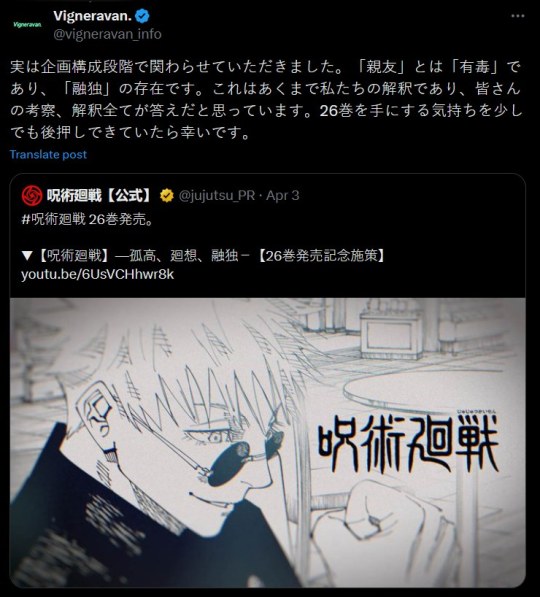
The tweet above is a QRT from one of the video producers for Gojo's 11-hour long tribute video, streamed on 3rd April till midnight to celebrate the release of JJK volume 26, "Heading South", on 4th April 2024. The video title is 孤高、廻想、融独 (Solitary, remagine, [fusion/melting]), revising Gojo's nice moments in his life with his friends and students.
The tweet says:
"We were involved in the planning stage. A "best friend" (「親友」/shinyuu) is a "toxic" (「有毒」/yuudoku [1]) and "melting" (「融独」/yuudoku [2]) existence. This is just our interpretation, but with everyone's thoughts, we have the final answer. We hope to able to encourage you to get Volume 26 even just a bit." (this is rough translation)
What is really the center of attention is this word 「融独」/yuudoku [2]. This is the 3rd word of the video title, but surprisingly, this word doesn't exist in the Japanese dictionary.
It is a completely new word created by the production team to describe part of Gojo's life. At the beginning, even Japanese fans had a hard time understanding what this word means. However, after Vigneravan's (the video producer) tweet, it is confirmed that 「融独」 is related to 「親友」/shinyuu/bestfriend. Gojo only has one and only one bestfriend, so this new term points to Geto.
The producer says "a bestfriend is a 'toxic' and 'melting' existence" when talking about Gojo's bestfriend, Geto. There is a wordplay here: both "toxic" 「有毒」[1] and "melting" 「融独」 spell the same way, "yuudoku". This fact is actually realized by fans in the way they assume how these characters are spelled when parts of them are used within other more common terms (especially when the referred term doesn't exist). 「融独」 is a combination of 融 (fusion/melting) and 独 (loneliness) - in literal sense, it means "melting the loneliness". In other words, the video producer's interpretation is "Geto, Gojo's best friend, is like toxin to him, but at the same time he melts away Gojo's loneliness".
Let's go back to Gojo's tribute video. This video starts with Gojo's birth, his youth, then his days as a teacher, and ends with him joining the battle with Sukuna, and finally going to the airport in the afterlife. Out of 11 hours, Geto appears in nearly 5 of them. The common vibe of the video is Gojo's happy moments with his friends, colleagues, and students. If you notice, there are NO scenes where he is fighting or in danger. The only distressing moments in the video are: when Geto becomes depressed, when Geto leaves Gojo, and when Gojo is left mulling in his own thoughts afterwards, sitting right where his bestfriend used to:
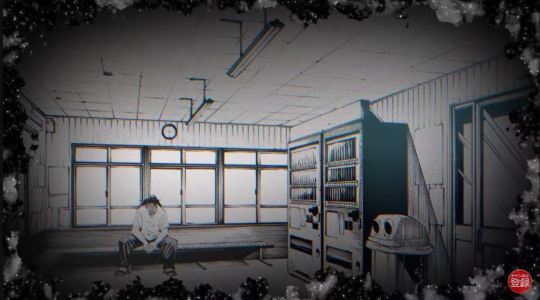
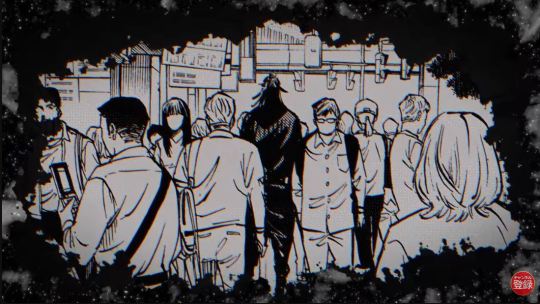


This means that the saddest and most depressing thing that ever happened to Gojo's life is when Geto left. And we all know how Gojo never forgets about him, and in fact, delays the time to execute Geto by order, only going down on him when Geto declares war 10 years later. This can be interpreted as part of the video producer's view, "toxic".
Yet, Gojo doesn't let Geto out of his mind. At the start of the video, after the images of him as a baby, Geto is the first person to appear in Gojo's life:

The above image gradually adds Yaga and Shoko afterwards. You can say that Gojo had no significant memories as a child, because he was born with powers and expectation, and thus, as a lonely kid. Meeting Geto, he has the first ever friend, an equal, someone who can understand him. So the memories when he first had Geto in his life, also indicating the start of his 3-year treasured bluespring, is when he finally turns from a lonely child to no longer lonely.
Yet when he loses Geto, he's become lonely again. Note that, Gojo has never been "alone", but he has been "lonely" (there has been many analysis for this, from Shoko's thoughts about him right before he gets released from Prison Realm, and in c236 when he confesses). Which turns out, Geto's existence is too big for him. Isn't it unhealthy to give so much leeway to an enemy, "the worst curse user of the jujutsu society", when he's supposed to execute Geto as soon as possible before he becomes a big threat? Yet, whatever Gojo has for Geto is too much and enough for him to give Geto freedom until he can't anymore; and after that, Gojo still wishes Geto had been there to pat him on the back before the fight with Sukuna, in order to fully feel satisfied. To wish for something impossible as an existence of the dead, who was supposed to be an enemy but wasn't.
It is "toxic", but Geto is exactly the only thing that can "melt his loneliness". That is why Gojo, who's been lonely all his life being the strongest, cannot let go of Geto in his mind. Geto has been the first one to make him change for the better, to stand by his side despite his status and origin, and even though he left, he's still Gojo's main source of inspiration to build his dream of changing the jujutsu system for the better, and to not let children fall for the same fate as his best friend once did, preserving their youth. Despite all the unfortunate events, Geto still stays as the special "toxin" to Gojo, the only one that can melt away his loneliness, the only person whose existence brings him satisfaction. (there's a whole topic on how the word "satisfaction" Gojo uses to describe his feelings when fighting Toji or Sukuna and the one used when describing Geto below are 2 similar terms with different connotations, but I'll leave that for another time)

For our own assumption, it is also likely that Gege Akutami is the one to come up with this word 「融独」. As the author who created Gojo and Geto as a contrasting pair, he is the one who understands their relationship the most. But mostly because he's one of the few people (involved in the series) who has deep understanding of Japanese language and often plays around with words. JJK very often includes highly complicated Japanese words and terms (even for Japanese readers), so for him to come up with a completely new word to pay tribute to Gojo is not out of possibilities.
And it leaves you in awe again how important Geto is to Gojo.
Watch the 11-hour tribute video:
youtube
P/s. by coincidence (or not), Tatsuya Kitani, the singer/songwriter for JJK Hi/pd arc's OP "Ao no Sumika", includes "Love Song" in the album Ao no Sumika. And this song is... well. A bit familiar.
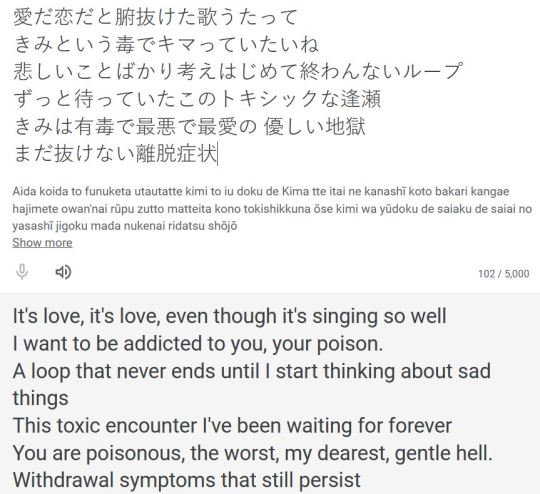
Would the song somehow reminds you of how the video producer perceives Gojo & Geto's relationship? It's up to you.
Funfact: in "Love Song", there is an interesting term: 眩しい常闇 (mabushii tokoyami) - "eternal dazzling darkness". This term is also the title of JJK volume 0 chapter 4.
#jujutsu kaisen#geto suguru#gojo satoru#jjk#satosugu#gege akutami#i don't feel like i explain everything i want to say#but im out of words T-T#you don't often have a ship whose relationship is so much you need a whole new word for them#personal
294 notes
·
View notes
Text
NEON Carnival Q&A Pamphlet Translation
disclaimer: apparently Taiwanese Mandarin is different from what I speak, so some of these may need to be taken with a grain of salt! my credentials are that my native language is Cantonese and I know - but am rusty on - Mainland Mandarin.
Q: Do the characters have set dick sizes?
A: The team has a "super⭐secret measure", every time they draw the characters they'll reference it.
Q: Between Quincy and Olivine, who has the bigger breasts?
A: The team fought over this and couldn't decide, so there's no answer.
Q: I want to know the ages of the long lived ones, the yokai, and the familiars! Who's the oldest?
A: From oldest to youngest are: Kuya > Quincy > Rei > Aster > Morvay > Yakumo > Garu. The specifics of their ages will be revealed in the game.
Q: Who's older between Father and Topper?
A: Father is older than Topper!
Q: The game has a lot of retro stuff, super curious about the producer's age!
A: Retro has nothing to do with the producer's age!!!
Q: How are the kinks of each room thought up?
A: The devs think of them in the small dark room, the artbook sketches include clues.
[t/n: I consulted two other Chinese speakers and I'm still not really sure what the answer actually means, so this is a best guess translation.]
Q: What's inside the small dark room?
A: Tired and busy devs......
Q: When designing event outfits, how do you decide where to open holes?
A: Different people will think of the parts they want to highlight, later on we'll also test different levels of nakedness. (it's not like we haven't thought of throwing darts to decide)
[t/n: little unsure about this one too. it's possible it means they think of which part of the characters they want to highlight, but they used 眷屬 rather than 角色.]
EDIT: @milkeumilkeou has informed me that in the specific context of nuca, 眷屬 means clan members. that's what I get for not playing the game in Chinese... in this case, the better translation is:
A: Depending on the clan member the devs will open the holes at the places they want to highlight, later on they'll also test different levels of nakedness. (it's not like they haven't thought of throwing darts to decide)
Q: How were the voice actors chosen?
A: The producer chose them according to the characters' personalities and the desired voice. Many thanks to the voice actors!
Q: How far in advance do future events begin production?
A: Usually the topic is decided on about 4 - 6 months in advance, and then production begins.
Q: I want to know which character the devs think would be the best coworker!
A: Everyone agrees the best coworkers would be Eiden, Edmond and Olivine; Dante's work ability is also very strong, but he's more like a head that scares people.
[t/n: 'head' may also translate to director or manager.]
Q: Do the characters have body hair?
A: The devs actually really wanted to draw it, but considered various realistic reasons, so the players can't see body hair, but you're free to imagine it! (let Quincy have some stubble... how would that be?)
[t/n: I would guess that the 'realistic reasons' they considered are probably that BL typically doesn't feature body hair, so it might've made the game less marketable.]
Q: Who has the most sexual experience?
A: Morvay! (super fast answer)
[t/n: the question is literally "who has the most experience♂️?" lol]
Q: Does the Klein Continent have a habit of wearing underwear?
A: Klein has underwear. Just like hats, gloves, and scarves, when considering factors like decoration and functionality, to wear or not to wear underwear, and what type of underwear to wear, all depend on each person's preferences.
Q: Is Eiden's light brown hair dyed?
A: Yes, and he'll regularly re-dye it.
Q: Does Eiden prefer briefs or boxers?
A: It's okay as long as it's snug and covers him, and he has some special styles.
Q: I want to know how Eiden gets to work!
A: Eiden rides a motorcycle, and on rainy days he'll switch to public transportation.
Q: What opportunity led to Eiden's interest in design? Did his designing always have to do with sex toys?
A: Eiden has had artistic talent from a young age, and hoped to turn his passion into a job. His first job was being a sex toy designer at Peak of Pleasure, and this job happened to combine his two interests of design and sex. Aside from the overtime, for Eiden, this was an ideal job.
[t/n: in case you don't remember, Peak of Pleasure is the name of Eiden's old workplace as mentioned in Journey to a NU World.]
Q: I want to know Eiden's relationship history! Did he have boyfriends before?
A: Eiden knew he liked men from a young age. When he was fifteen he had a bitter first love, and afterwards his partners were all short term. Towards relationships he carries a generous attitude of easy-come-easy-go, and thinks that being happy in the moment is more important.
Q: Does Topper have others of his kind?
A: He used to, but when he met Quincy, among those of his kind only Topper was left.
[t/n: 手足 may also translate to 'siblings' or 'close friends', as opposed to 'others of his kind'.]
Q: Who makes Topper's outfits?
A: Sometimes they're prepared by Quincy, sometimes they're made by Eiden.
Q: Does the food Topper hide in Quincy's hair affect Quincy washing his hair?
A: No, Quincy will wash his hair when it needs to be washed. But not long after Quincy washes his hair, the food stores in his hair will be quickly refilled by Topper.
Q: I want to know Topper and Father's weights!
A: Little animals' weights will fluctuate, but there's no direct link to fur amount. Topper weighs about a third of a pampo, Father only weighs about half a music box.
[t/n: pampo as in the pumpkins from Eerie Escapade.]
Q: What's Yakumo's signature dish?
A: He's good at everything, especially savory food. Because of his grandparents' influence he rarely eats sweets, and he can't quite grasp the seasoning amount, but after meeting Eiden he's begun to research sweets recipes.
Q: How is Edmond's knights' uniform worn?
A: The uniform has a top piece and a bottom piece, the jumpsuit has a zipper on the back for convenience.
Q: If Edmond came to Taiwan, how sweet would he order his boba tea?
A: After ordering full sweetness, Edmond would feel that it could be twice as sweet.
Q: How many nipple chains does Olivine have?
A: Olivine makes all of his own nipple chains. He'll change them based on style and mood. The number continues to increase.
Q: Will Quincy help brush Topper's fur?
A: Quincy will sometimes help brush Topper, but most of the time Topper will groom himself.
Q: Quincy, Olivine, and Kuya, who would win an arm wrestling match?
A: Olivine would win, because Quincy wouldn't take it seriously and Kuya wouldn't compete.
Q: Please reveal Kuya's real height!
A: It's 178cm ^^.
Q: I want to know Kuya's experiences before and after becoming a yokai!
A: Kuya's journey of becoming a yokai will be revealed in future scenes. What can be revealed now is that, after Kuya became a yokai, he was a lawbreaker for some time...
Q: When Kuya addresses Quincy, why did it change from "boring associate" to "old friend"?
A: When Kuya says "old friend" he doesn't mean true friends, he just likes addressing people in ways that make them uncomfortable, like "Master Rei".
[t/n: Kuya probably didn't call Quincy "boring associate", but I have no idea where to begin looking for what he actually called Quincy.]
EDIT: Kuya used to call Quincy "boring clan member" rather than "boring associate". credit to @milkeumilkeou once again!
Q: Does Garu sleep nude?
A: He doesn't like pajamas that are restrictive or impede movement, but if it's cold Eiden will wrap him up in clothes or a blanket!
Q: When Dante first adopted Sooley, how did they get along?
A: At first Dante got bitten terribly, because he tried to train Sooley to do various tricks. As they spent more time together, the two eventually developed some mutual understanding of wildness.
Q: Can Dante swim?
A: Dante thinks that with something as small as swimming, you just need to learn!
[t/n: Dante dodges the question here and neither confirms nor denies whether he can swim, just says that anyone can learn. knowing how he is, he's probably being ambiguous because he doesn't want to admit he can't.]
Q: How many darlings has Blade made?
A: Because Blade's favorite is cute things, it's infinitely increasing......
[t/n: 'darlings' as in the goofy little statue guys]
Q: Has Rei always been in the Water Territory? Has he moved before?
A: Rei doesn't have a fixed home, he moves regularly. The room in the Water Territory is just one of his hiding places, it used to be an abandoned house.
Q: Does Rei eat when he's experimenting?
A: He'll eat if he remembers, if Father's there he'll also remind Rei.
Q: If Fluff Balls think Fluff Balls are cute, will they eat their own kind?
A: They won't eat each other. If there aren't cute things around, the Fluff Balls will journey in search of them.
[t/n: since when was eating cute things part of Fluff Ball lore...?]
Q: Where is everyone's erogenous zones?
A: Aside from the gemstones, everyone's erogenous zones are as follows:
Eiden: lower abdomen
Yakumo: tongue
Edmond: nipples
Olivine: entire chest
Quincy: dick, palms
Kuya: ears
Garu: tail
Blade: darling♡
Dante: tattoos, especially the Adam's apple and fingers [t/n: might be throat instead of specifically Adam's apple]
Rei: moles
Q: I want to know where everyone starts washing when they shower!
A: Hair: Eiden, Yakumo, Edmond, Olivine, Topper (the fur on top of his head)
Face: Dante, Sooley
Upper body: Quincy, Father (chest feathers)
Lower body: Garu (tail first), Morvay (also tail first♂️)
Anywhere's fine: Rei, Blade (e-droids' bodies will automatically maintain cleanliness)
Kuya: nobody knows where he washes first, but it's said he showers every day
Aster: likes to bathe
Q: When drawing characters, are there emphasized specialties?
A: Eiden: dick size, the balance of everything
Yakumo: height, his slender body, the size of his feet as proportional to his height, finger length
Edmond: waist to hip ratio, thighs
Olivine: chest, eyes
Quincy: arms, shoulders, pecs, Topper
Kuya: face, palms
Garu: his face/cheeks shape, his round butt
Blade: eyes, balanced model-like body, his cheeks when he smiles
Dante: perfectly triangular upper body
Rei: the firm lines of his body
Aster: brattiness and cuteness
Morvay: muscular but not too buff
Q: In Aster's mansion, does everyone have their favorite locations?
A: Eiden: his own study (he designs a lot of things here)
Yakumo: kitchen (cooking)
Garu: kitchen (stealing Yakumo's cooking)
Edmond: garden (frequently has afternoon tea here)
Olivine: library
Blade: library
Quincy: quiet places where he can sleep
Kuya: next to the fireplace
Dante: living room
Rei: places to put collectables
Aster: personal money vault
Morvay: likes being outside, doesn't like staying home
Q: Do the characters have personal clothes?
A: Eiden: in his rebellious phase he liked dressing up, now he prefers simple, comfortable clothes. He has a changing room at Aster's house, and every event he'll absorb the local trends and design outfits that fit Klein aesthetics and seasons.
Yakumo: aside from traditional snake yokai attire, Yakumo's clothes are almost entirely bought by his grandparents.
Edmond: because he's nobility, he has a lot of clothes.
Olivine: because he dedicated his life to the priesthood, Olivine doesn't have many personal clothes.
Quincy: he has few clothes. Most of them are made by him, so they're rare.
Kuya: he likes trendy and new stuff, so he has a lot of accessories.
Garu: it was only after he started living with Aster that he started getting more clothes (Aster and Eiden buy a lot of clothes for him).
Blade: he'll wear whatever people give him, and he looks good in everything.
Dante: he doesn't like wasting money, but as the Sun Lord, he has special outfits for important occasions.
Rei: it's fine as long as it's wearable, he prioritizes ease of movement.
Aster: prefers pretty, fancy designs, and especially likes clothes with cute accessories.
Morvay: likes practical (easy to take off) clothes.
267 notes
·
View notes
Text
Real World Cultural and Linguistic Influences in Delicious in Dungeon (NON-FICTION)
It's here! It's finally here!
Well, chapters 1-7, the first 98 pages (52,837 words) of the essay are done!
This covers what the essay is about, my methodology, translation issues, the Dungeon Meshi world in general, and the names and cultural references relevant to all of the Tall-man characters. More will be coming soon.
SUMMARY:
Dungeon Meshi is full of vivid and complex world-building. When you take all the information in the manga as a whole, there are clear and consistent patterns in what real world cultures the author was inspired by, and how she arranges them on the Dungeon Meshi world map.
In this essay, I will catalog and explain every real world cultural reference I was able to identify in the manga, including character and location names, historical and mythological references, clothing, and of course food!
WARNING: This essay is full of spoilers for the entire Dungeon Meshi manga, all the extra materials, and the anime. Disturbing and violent moments that happen in the series are described, discussed and analyzed. The essay also discusses real-life world history and mythology, which contains sensitive subjects like war, death, slavery, abortion, child killing, sexual assault, incest, and bestiality. These topics are mentioned in an academic context, and not described. Please proceed with caution if this concerns you.
READ IT ON ARCHIVE OF OUR OWN
#dungeon meshi#delicious in dungeon#Dungeon Meshi Research#Laios Touden#Falin Touden#Marcille Donato#Kabru of Utaya#Kabru#Rinsha Fana#Thistle (dungeon meshi)#Thistle Merini#Yaad Merini#Delgal Merini#The Winged Lion#Toshiro Nakamoto#Maizuru#Hien#Benichidori#Inutade#Izutsumi
279 notes
·
View notes
Note
Do you see the differences between the game and the novel Twisted Wonderland? I didn't notice much until I searched on Youtube, Novel Ace was ready to apologize to Yuu ( in this case Yuuya) for insulting, Malleus isn't our little sweet dragon boy but literally choking Yuuya ?!



Yes, I do keep up with the differences between all official adaptations of TWST! This includes the light novel, which in my opinion has the most frequent and significant deviations from the game. It’s been very interesting to compare the two.
I don’t immediately comment on every change (of which there are many) I see unless specifically asked about it or I notice something pretty major. Some examples of the latter would be the like novels elaborating on Leona’s motives or Riddle’s flashback and the consequences of his actions.
I think this is facilitated by two factors: 1) the light novel format allowing for more space to expand on ideas and concepts, and 2) Yuuya is the most different Yuu we’re gotten. The game Yuu is very much a blank slate for players to project onto in order to easily immerse them in the story. Meanwhile, the manga Yuus tend to be the “helpful” types that move the story along in their own way. This is because the manga has limited space in the magazines they run in, so they need to keep things snappy and follow the main story pretty strictly. The light novel is able to stop and have the POV character reflect, doubt themselves, and refuse involvement because a medium that is inherently mostly words forces you to slow down and take in everything on the page. There’s no limit or demands of a book, so the events have much more time to “marinate”.
Personally, I really love a lot of the minor changes in the light novel. I feel they really flesh out the relationships between characters, particularly Yuuya and his friendship with Ace and Deuce. Ace actually has the guts to realize he was the one who fucked up and apologizes for being an ass. It’s so in line with the brutal honesty he dishes out it to others. Deuce stays up late into the night talking to Yuuya and makes them feel welcome because when was the last time he had done anything like this? Yuuya was always the loner back home, ignored by his classmates and feeling invisible. Now he has loyal friends who got his back and actively tell off mob students who sneer at his enrollment. Moments like this make me really care about their bond and make it more believable that they would trek halfway across Twisted Wonderland to come to Yuuya’s aid in the eventual book 4 of the novelization.
dbksbejwjwwhei The one thing that caught me off guard about your ask was the “Malleus chokes Yuuya” part, which I do not recall ever happening 😅 I went back into the light novel to cross reference just in case I had forgotten! I believe you’re referring to when Yuuya and Malleus first meet in book 2? In which case, I think there was reader misinterpretation involved.
What happens is that Malleus begins to introduce himself, then stops and says he permits Yuuya to pick a name for him. But Yuuya, feeling uncomfortable with the idea of nicknaming someone he just met, so he asks for Malleus’s actual name (something which game Yuu does not do). This incurs Malleus’s anger—“I have said no. Did you not hear me?” It is then that we get a few paragraphs describing how Yuuya goes “stiff”, a “briar-like tension seizes his body, making it impossible to move”, “fear [making his] heart race”, he “[forgets] to breathe” etc. (Fan translation by Yuurei!)
To me, that… doesn’t read as Malleus choking Yuuya, let alone laying a finger on him. It’s more like Yuuya is so consumed by fear that he finds himself entirely paralyzed and unable to argue back, so instead he submits and lets the subject drop. There’s no mention of Malleus “letting go” or anything either, just the fairy lights brightening again once his mood clears and he realizes Yuuya isn’t looking to defy him. It’s also important to note that, previously, the night in this scene was described as tranquil and pleasant—the emphasis is on how Malleus’s mood shifts the atmosphere and the “feeling” of the night.
So!! The “seizing” mentioned is NOT literal; a feeling could “seize” you too, coming in suddenly and with great power. This is a literary device known as personification, or giving a non-human object or action human-like qualities or skills. When used to describe the briar-like feeling, it’s also a simile, which is when you use “like” or “as” to compare two things.
… Besides, imagine Yuuya being choked out by someone during your first meeting and then no description of him freaking out?? And then still building a whole friendship based on this weird encounter??? Even though Yuuya has a history of catastrophizing and even thinks about Leona explicitly tearing his throat out just because of Leona’s powerful presence???? That just does not make sense. It also doesn’t make sense for Malleus’s character. Yes, he can lash out at people, but here it feels like he’s telegraphing his displeasure (via the atmosphere, similar to how his mood disrupts the weather) rather than resorting to a physical attack (or using magic to bind someone in place).
#twisted wonderland#twst#Malleus Draconia#Riddle Rosehearts#Leona Kingscholar#Deuce Spade#Ace Trappola#twst light novel#twisted wonderland light novel#disney twisted wonderland#disney twst#notes from the writing raven#question#Kuroki Yuua#Yuuya Kuroki#Yuu#twst manga#twisted wonderland manga
214 notes
·
View notes
Text
The meaning of “The Untamed”
someone asked me to elaborate and who am i to say no? (i asked for it in the tags)
The Untamed isn’t a translation of 陈情令 (chén qíng líng) so when people discuss the title they typically toss out or brush off the english title entirely.
but that’s because it’s not a translation of 陈情令 it’s a translation of 无羁 (wú jī) the theme song of the series.
yippe explaination set up
i’d also like to make this post new fan and/or cql only fan friendly so i’m going to go in depth about the significance of 无羁 before explaining how it connects to the english title.
first the chinese characters for wwx and lwjs names
Wei Wuxian — 魏无羡
Lan Wangji — 蓝忘机
in the novels the song Wei Wuxian plays on the flute, that Lan Wangji played for him in the cave with the Xuanwu of Slaughter is expressly titled 忘羡 (wàng xiàn). the ship name we all know and love consisting of the first character of Wangji and last character of Wuxian.
so the track in cql is titled 无羁 the first character of Wuxian and the last sound of Wangji.
now the translation explanation
无羁 directly translates to unbridled, unfettered, or untamed
so The Untamed as the english version of the title is literally a mixed up version of their ship name in english! when you say “i’m watching The Untamed” in a way you’re kind of saying “i’m watching Wangxian”.
how does this relate to the name 陈情令?how did this become the english title?
i’d like to refer you to this post as it explains in depth better than i can the meaning of 陈情令.
directly translated 陈情令 means “a song from chén qíng”, being the name of Wei Wuxian’s flute. however, 陈情 itself has two translations. first being to reminisce past relationship. (referring from the linked post please check it out)
Wuji is a song both played literally on the chen qing flute, but is also a song reminiscent of a past relationship. ofc it’s of a present relationship now but throughout the series, you get what i mean.
so Wuji, or The Untamed, makes perfect sense to be the english title for the show.
ALSO!! felt i should include this
《 魔道祖师:无羁 》 or “Mo Dao Zu Shi : Wu Ji” is the official name for the books printed in mainland china afaik.
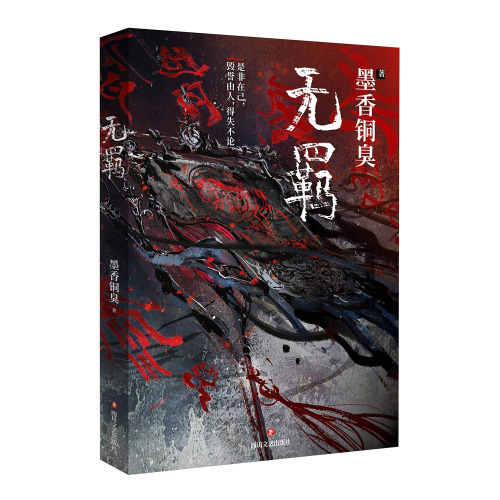

i got like maybe 2 hours of sleep last night and i’m running on 3 cups of coffee so far so this is what happens
if there’s any questions feel free to ask <3
post for @baby4012
#mdzs#mo dao zu shi#the untamed#cql#wei wuxian#lan wangji#wangxian#wuji!!#danmei#does this count as a meta post what is meta posting idk#rambling ofc
168 notes
·
View notes
Text
Spy x Family Exhibition Pamphlet
I got my copy of the Spy x Family exhibition pamphlet! I wanted to make HD scans of some of the notable pages and try to translate if I can.
First off is this great "Main Character Correlation Chart" (sorry for my amateur editing, all I have is MS Paint!)
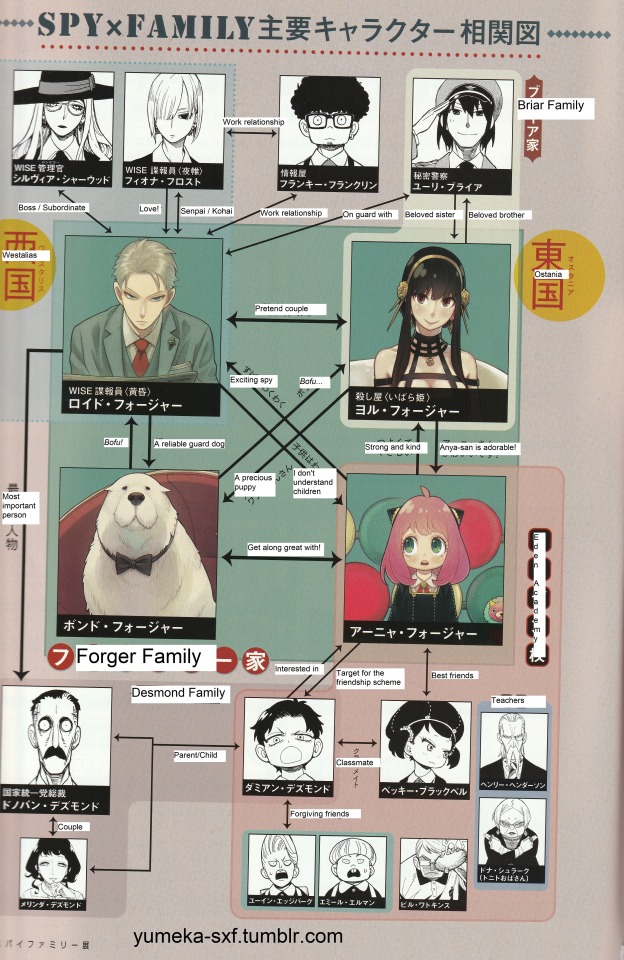
I love how Bond has a different "bofu" (woof) for Loid and Yor!
Several of the pages show the creation process of the manga, starting with rough sketches to final drafts, using chapter 1 as an example. There were a lot of pages for this, so I just scanned the ones that showed the end of the chapter.
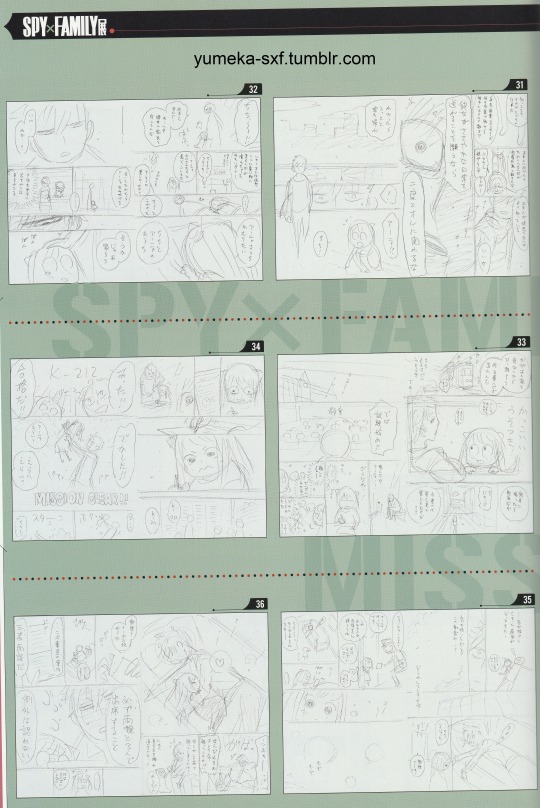
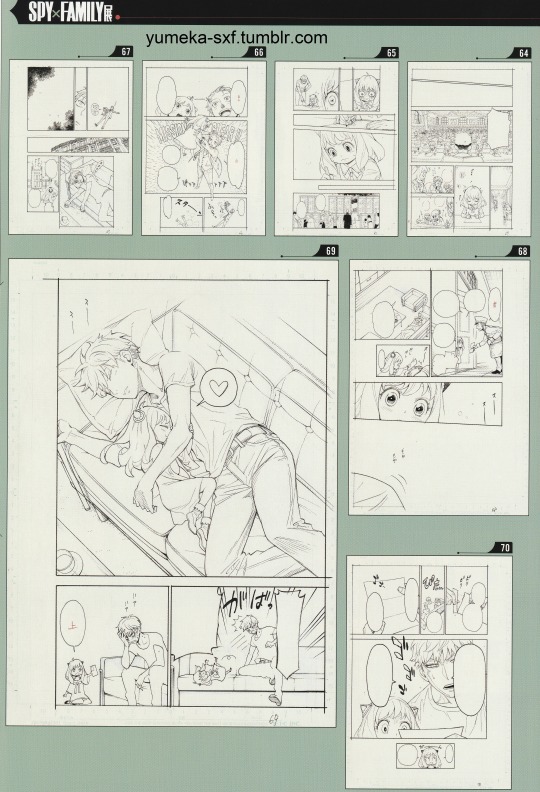
Probably the most interesting pages of the pamphlet are the early character designs/concept sketches. Most of these have already been shared by @sy-on-boy on her post here, but I thought it'd be cool to have them in HD! Unfortunately, even with higher quality images it's very difficult to decipher Endo's handwriting. I could make out just a few words here and there, and Google Lens is very unreliable when the writing isn't clear.
The first page has early concepts for the Forger family, Loid, Anya, the WISE logo, and the Eden uniform.
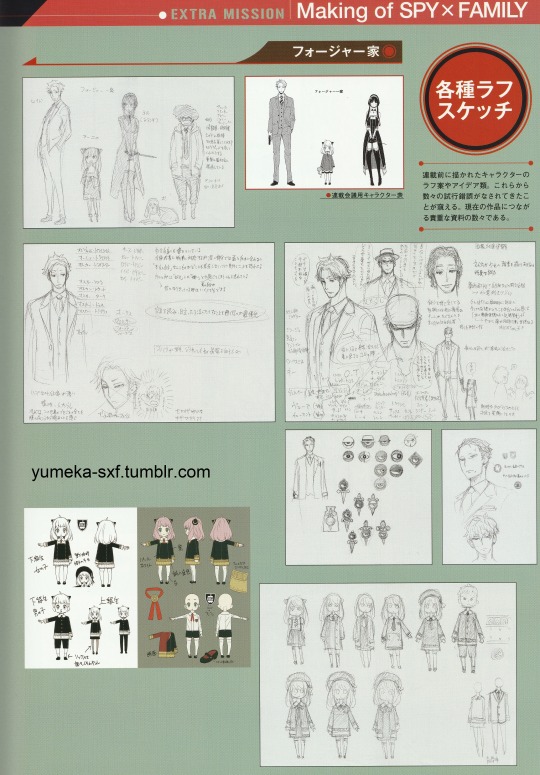
Things to note are that "Oscar" was a working name for Loid, as was "Yolanda" for Yor. What's also interesting is that a beta version of Franky is shown along with the Forgers. Unfortunately I can't make out the notes about him, but I think this has significance because of a sketch on the next page...
Most of the next page shows concept designs for Yor, with a section for Bond and Yor's coworkers on the bottom.
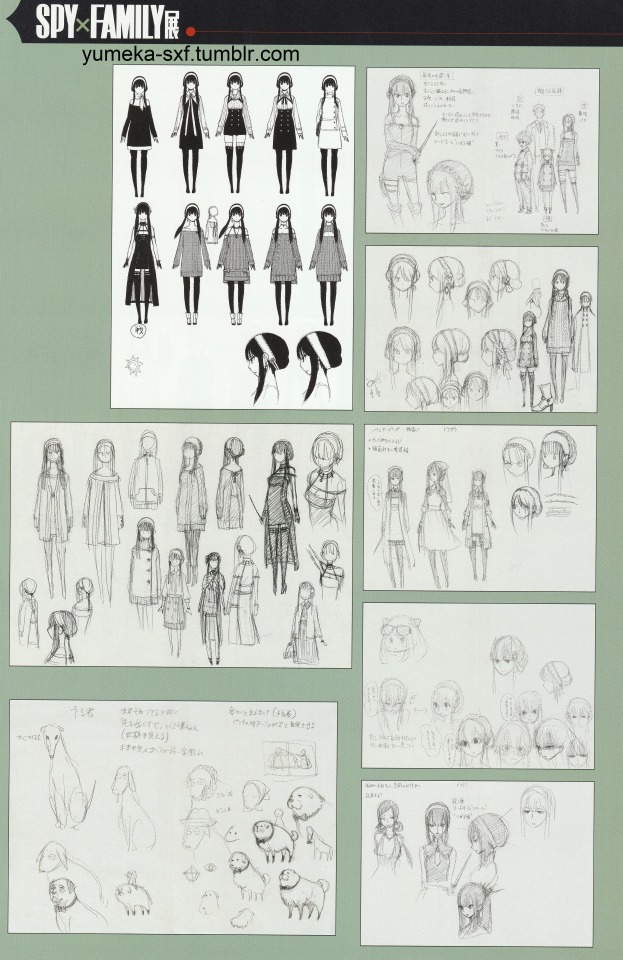
However, what's really intriguing is the sketch in the upper right of the whole family, titled 疑似家族 (pseudo family).
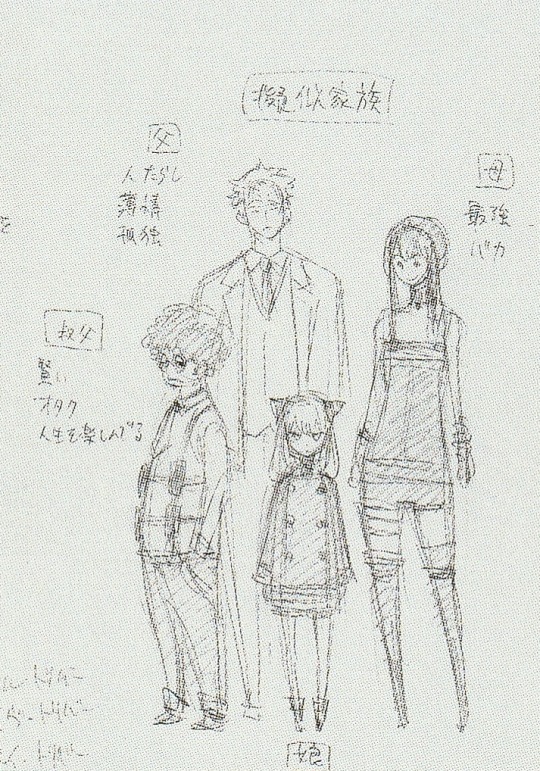
Once again, a Franky-looking character is with them, and he has the title "Uncle" (叔父) Was an uncle originally going to be part of the main Forgers? Was he actually related to Loid or Yor, or if that character did eventually become Franky, maybe he would just pretend to be Loid's brother? I can also make out the word "otaku" (オタク) in the notes for this character as well as "enjoying life" (人生を楽しんでる) Also in the notes for beta Yor it looks like 最強 (the best/strongest) and バカ (idiot/dummy) All I can make out for Loid's notes are 孤独 (loneliness) I think? And what's up with the older and more sinister looking Anya? She really looks like Ashe there. But these are all just early concept designs/notes so I wouldn't take them too seriously.
The next page titled "East and West During the Cold War" has concept designs for Franky, Yuri, Fiona (referred to as a female WISE spy), a male WISE spy, Melinda, and various assassins from the cruise arc.
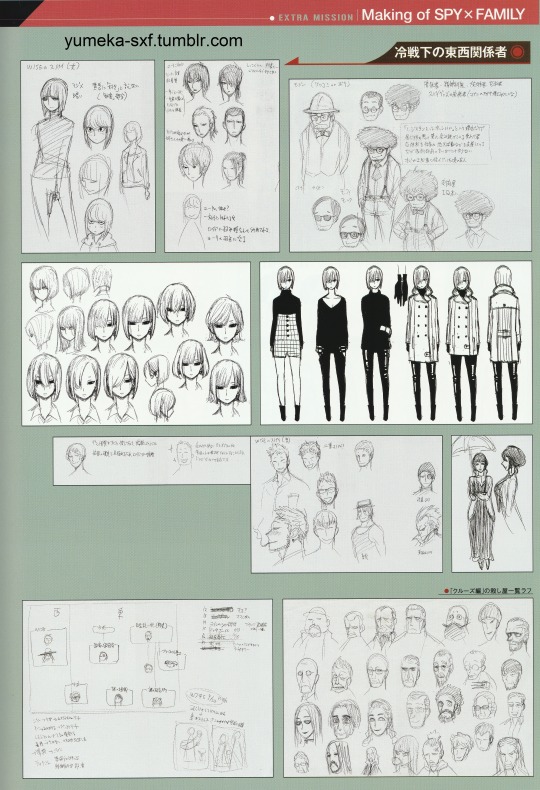
The first interesting thing to point out is the notes next to the very crudely drawn woman at the bottom of Yuri's concept designs. It says "Yuri's girlfriend?"(ユーリの 彼女?) though I can't make out clearly what the rest of it says. For the Franky designs, I could make out "tsukkomi or boke". So it looks like at some point Endo was deciding whether to make him more of a tsukkomi (straight man) or boke (wise guy) personality. There's also mention of giving him a high IQ (IQ高い). Also, the fact that the sketches include Melinda and the cruise arc assassins gives the impression that Endo had ideas for these story elements very early on.
But the character relationship chart in the lower left is really intriguing.
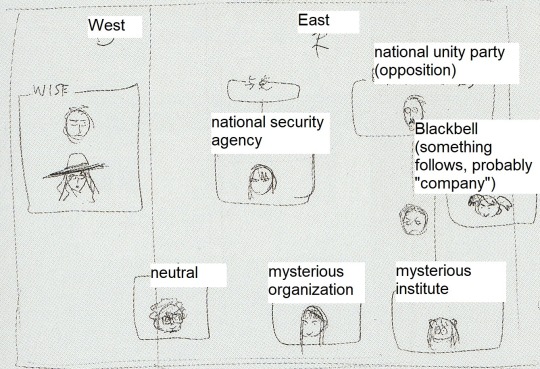
I'm not sure how accurate these translations are so take them with a grain of salt, but they do make sense to me. But I have to wonder why Anya and Becky are connected to Desmond. For Becky, it could be because her family has ties to the Desmonds, but why Anya? Could the "mysterious institute/lab" she comes from have ties to Desmond too? Again, these could just be early concepts from ideas that Endo is no longer using, so best not to take them literally. Also, the lack of Shopkeeper/Garden in the character relationship charts, the concept art, and the exhibition overall, really does portray them as a "mysterious organization" that Endo perhaps didn't plan out until later in the series' development and is still trying to figure out. But as far as this sketch, I have to say that despite how terribly crudely drawn all their little heads are, it's easy to identify every character...proof of Endo's top notch character design skills!
Another sketch that stands out is on the same page...
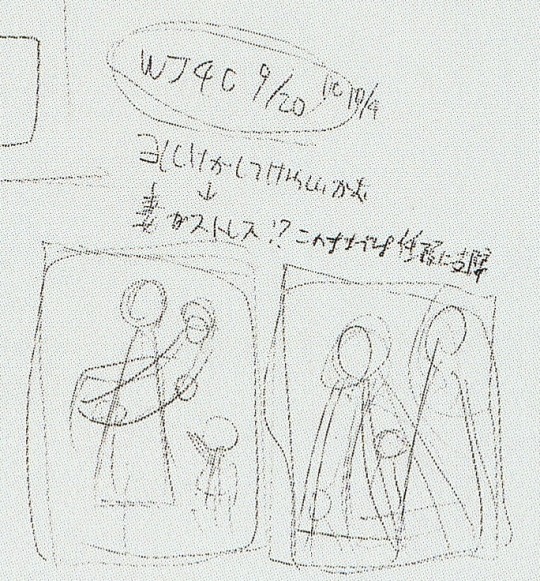
It's a very rough drawing of what appears to be either Loid holding Yor or Yor holding Loid with Anya next to them. But honestly it's such a rough drawing it could be any other parents+child. All I can make out of the text directly above is "My wife is stressed!? At this rate..." And the drawing next to it also appears to be two parents and maybe two children? I also have no clue what the "WJ4C 9/20, etc" at the top means. Very mysterious sketch, lol.
The next page has Eden related concepts, including Becky, Damian, George, and various teachers. The drawings in the bottom section appear to be an alternate/abbreviated version of how the Forgers met.
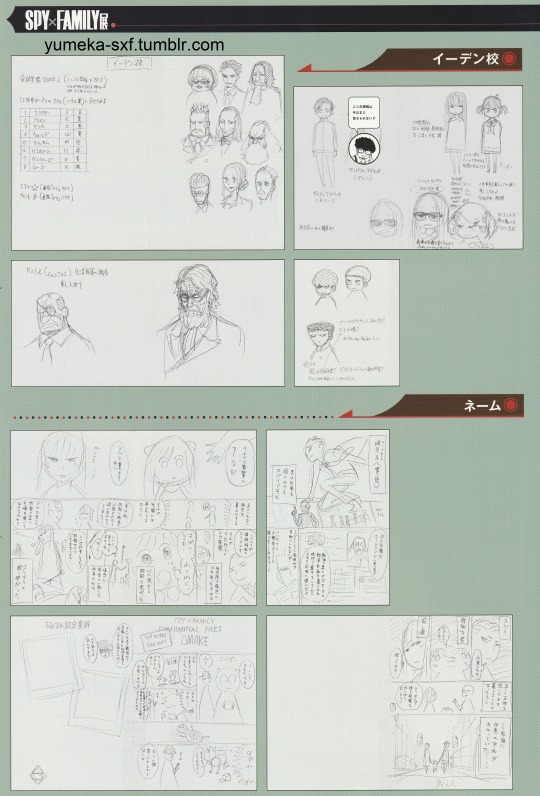
Pretty funny that an image of Franky is covering what's supposed to be a sketch of Demetrius. The text from Franky says "I can't show you this information yet" which is pretty solid proof that Demetrius will make an appearance in the series eventually. There's also nicknames for Damian and Demetrius in the notes - "Dami" and "Demi."
Some notes on the Eden page says there's 2,000 students in the school, with 13 grades divided into 8 classes/houses. The chart on the left is a list of teacher names and their classes, all of which are given names of colors. None of the teacher names have been used so far in the series.
And all that's on the last page of sketches is a continuation of the previous page with the early concept of how the Forgers started (it honestly looks pretty cute, wish it wasn't just rough sketches). And the following section looks like drafts Endo did for promotional material.
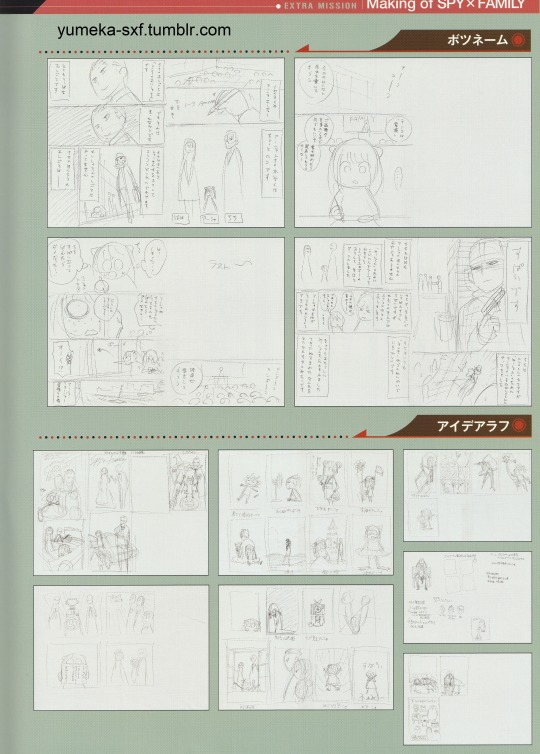
The final pages of the pamphlet are the new extra mission chapter which I already fully translated here.
And that's all I'm going to share for now from the pamphlet! I could spend more time trying to decipher the concept art notes but it was giving me a headache after a while, lol. But if anyone wants to try translating them, go ahead (I have higher quality png files of all the scans if needed...they were too big for Tumblr). And again, these sketches are just trial and error pre-serialization ideas that don't necessarily reflect Endo's final vision for the series, so I wouldn't dwell on them much other than for fun theorizing.
The pamphlet does have other interesting information, including an interview with Endo, a timeline of his work on Spy x Family and other manga, and his notes about random things from the series. So I might return to translating the pamphlet at a later date when I have time/motivation.
#spy x family#spy family#sxf#spyxfamily#loid forger#yor forger#anya forger#bond forger#sxf spoilers#sxf manga#sxf manga spoilers#sxf scans#yuri briar#damian desmond#becky blackbell#fiona frost#franky franklin
431 notes
·
View notes
Text
haiku misinformation: a fact check
there's an post going around about haiku that has a lot of incorrect information about haiku, its terminology, history, etc. I will try to debunk some of the biggest inaccuracies here. everything in quotes is a direct statement from the original post. this is also really, really long.
"Haiku are made of 14 on, which are essentially the equivalent to Japanese syllabic structures, except the nature of how Japanese as a language is constructed versus English means that any given proper haiku could be translated in extremely and intensely different ways, each giving a subtle but distinctly different meaning."
Starting off strong - haiku are (usually) made of 17 on. It's the classic 5-7-5 pattern! 5+7+5=17! [possibly this is a mix-up with wakiku (脇(わき)句(く)) which is another type of Japanese poetry that does use 14 on but who knows.]
Definitions: an on is a phonetic unit, the equivalent to a mora (pl. morae) in English. this concept a) exists in English and b) like on, is related to syllables but distinctly different from them (i.e. ba is one mora but baa with a long vowel is two morae). On can be counted using the number of hiragana (phonetic syllabic characters) when the text is transliterated, so a word like Osaka that has the long O sound (made up of 4 kana) would be 4 morae or 4 on (o-o-sa-ka; おおさか). it's not really a syllabic structure at all, and more importantly has nothing to do with translation. idk where that last part comes from because that's really...not the point here. Yes, any given "proper" haiku could be translated in different ways with a subtle but distinctly different meaning but that's true of just...translation, period. check out Deborah Smith's translation of The Vegetarian by Han Kang for more on that.
Furthermore, haiku were/are not rigidly locked into the 5-7-5 on pattern. That's just not true, which is why I said usually above. Easy example: a 1676 haiku by Matsuo Basho that uses 18-on:
冨士の風や 扇にのせて 江戸土産; ふじのかぜや おうぎにのせて えどみやげ; the wind of Fuji /I've brought on my fan/a gift from Edo <- that first line is 6-on!
2. "The best way I can explain what I mean is that in English a good poem can be defined as a shallow river, whereas a good haiku is a deeply-dug well."
Not dignifying this with a response. Deeply incorrect and untrue. @bill-blake-fans-anonymous can handle this assertion.
3. "The presence of the kigu. There is a specific series of characters/words which are used to imply a season, and specifically a specific aspect of a season which the haiku revolves around. The creation of a haiku is often done as a meditative practice revolving around the kigu--you're essentially contemplating on this particular natural feature (nearly always the temporal aspect emphasizes either ephemerality or the opposite as well bc Buddhist ideas of enlightenment and beauty begin coming into play) and building an evocative and purposeful point that revolves around it like a hinge. It functions as both ground and anchor."
First (and largest) problem: the word. is. kigo. kigo. It's ki (季; season)-go (語; word) = 季語. Both the English and Japanese language Wikipedia, or a 3-second google search, will tell you this immediately. I have no idea where the term kigu comes from.
Second problem: plenty of haiku, both traditional and contemporary, do not use kigo. these are described as muki (無季; seasonless). Matsuo Basho, the haiku-writing poet non-Japanese people are most likely to know, wrote at least ten seasonless haiku that exist today. Masaoka Shiki, the Meiji-era haiku poet and reformist, wrote hundreds of kigo-free haiku and as an agnostic, tried to separate haiku from Buddhism and focus more on the shasei, the sketches from daily life. you can actually, today, buy what are called saijiki, which are lists of words and terms that refer to specific seasons (in the traditional Japanese calendar, so there are actually a lot of "micro" seasons as well). some saijiki include a whole section of "seasonles" words - here's an article about non-season kigo in a saijiki.
so the claim that English-language haiku are invalid or not "real" haiku because they lack a kigo doesn't hold up, unless you invalidate a whole bunch of Japanese haiku as well. the op also claimed they would categorize a lot of English "haiku" as senryū which is...an opinion. Yes, haiku tend to be focused around nature (more on that below) and senryū tend to be more comedic or about human foibles but...that's it! it's a tendency! it's not a hard and fast rule!
Third problem: the claim that a haiku is as meditative practice revolving around the kigu kigo...yeah, no. the earlier form of haiku, the hokku, were the introductory poems of the longer poetic form, the renga and the hokku gradually became a standalone poetic form known as haiku. the hokku had a lot of purposes and we have a historical record of them going back ~1000 years to Emperor Juntoku where they were declamatory poems tied to events (births, deaths, etc.) or social events (moon-viewing parties) - not really meditative. haiku, if a genre can focus on a single idea, focus on an experience and that can be real or imaginary, direct and personal or neither.
Here's another Basho poem for your consideration:
夏草や 兵どもが 夢の跡 (natsukusa ya tsuwamonodomo ga yume no ato; summer grasses--/traces of dreams/of ancient warriors)
both the dreams and the grasses are those of Basho (contemporary) and of the warriors (ancient); it's about travel, it's about connecting the present to the ancient past, it's not really so much about the summer.
(Fourth, minor problem that I'm not really going to get into: you'd have to take this 'Buddhist ideas of enlightenment and beauty' up with haiku scholar Haruo Shirane but he explicitly says in the Routledge Global Haiku Reader (2024) that "pioneers of English-language haiku [such as D.T. Suzuki, Alan Watts, and the Beats] mistakenly emphasized Zen Buddhism in Japanese haiku".....so.)
4. "The presence of the kireji...it's a concept borderline absent from English because it's an intersection of linguistics and philosophy that doesn't really exist outside of the context of Japanese."
Let's begin with clarification. What is kireji (lit. a 'cutting word')? It's a class of terms in Japanese poetry that can do a few things, depending on the specific kireji and its place in the poem. In the middle of the poem, it can mark a thematic break, a cut in the stream of thought highlighting the parallel(s) between the preceding and following phrases. At the end of the poem, it provides a sense of ending and closure - it helps mark rhythmic division, to say the least, and it is seen as the 'pivot' word.
Two problems with claims above:
a. there are haiku that do not use kireji. For the hat trick, here's a Matsuo Basho haiku from 1689 AD that is kireji-free:
初しぐれ猿も小蓑をほしげ也 (hatsu shigure saru mo komino wo hoshige nari; the first cold shower/even the monkey seems to want/a little coat of straw) <- NB: I love this haiku so much
b. the idea of a kireji, as in a pivot word that provides an inflection point with rhythmic division and structure, exist not just in English poetry but in multiple different types of poetry across time and space! The caesura in Latin and Ancient Greek! The volta in sonnets! Whatever is happening in the third line of the Korean sijo!
final thoughts:
the op included language, which I won't quote here because it was messy and tied into other rbs, about Orientalism and appropriation in English-language haiku, which is definitely a real thing. but this blanket statement ignores that the relationship between haiku and "the West", much like Japan and "the West", was and is not a one-way street. Western writers were influenced by haiku and, in turn, those writers influenced Japanese writers who wrote haiku inspired by these influences - this process has been going on for well over a century. Furthermore, English and Japanese are not the only languages in which haiku are written! Nobel Prize winner Rabindranath Tagore was writing haiku in Bengali; other Indian poets were and are writing them in Gujrati and Malayalam, particularly by the poet Ashitha. the Pakistani poet Omer Tarin has written haiku about Hiroshima! The Spanish poet Lorca published haiku in, get this, Spanish, in 1921 and the Mexican poet José Juan Tablada published more in 1922! Italian translations of Yosano Akiko were published in 1919! any discussion of the idea that English/non-Japanese-language haiku aren't really haiku because they don't hold to the "rules" (which Japanese authors have been revising, adapting, critiquing, and/or straight up flouting for centuries) or because English/non-Japanese poetry is "a shallow river whereas a good haiku is a deeply-dug well" just shows a lack of knowledge around traditions and depths of...well, poetry itself.
my god this is so long.
in summary: this is a complex topic. If anyone would like some actual information about haiku, its history, common themes and forms, or a collection of good poets, the Routledge Global Haiku Reader (2024) and Haiku Before Haiku : From the Renga Masters to Basho (2011) are great references and really accessible in their language! hmu if you're interested and I can send you some pdfs.
#'99% of all haiku written in English might at best be called a senryu' is QUITE a take#the idea that kireji is a uniquely mysteriously super special Japanese term that has no equivalent and could never be understood. hm.#where have I heard that line of thinking before.....#haiku#Japan#long post
89 notes
·
View notes